
The basketball court was always m) refuge.That's where I went when I needed to go somewhere to find an answer to a problem, or just to calm m) mind. When 1 first signed with the Chicago Bulls in 1984, the NBAs Uniform Player's Contract included a clause that prohibited players from certain activities during the offseason, including playing the game. If you played without obtaining permission from the team and were injured, the team could get out of their contract with you. There was no way I could live with that kind of restriction. I needed to play Not only had I always found comfort on the court, but I used the summer to improve.The Bulls finally agreed to include what I called the
"Love of the Game Clause."
At the time, very few play ers, if any, had the kind of freedom the Bulls gave me. I could do what I had always done.
I could play the game of basketball without consequence.





WHEN I THINK OF MY CAREER, WHERE I HAVE COME FROM, WHERE IT ALL BEGAN, AND ALL THAT I HAVE ACCOMPLISHED ALONG THE WAY, I REALIZE EVERYTHING DID CHANGE AFTER THAT GAME. NOT JUST BASKETBALL BUT MY LIFE.
I THINK MY FATHER SAW SOME THINGS IN ME THAT I COULDN'T SEE IN MYSELF.
AT FIRST, I JUST THOUGHT IT WAS A FATHER'S PRIDE, THE VOICING OF HOPES AND DREAMS FOR A SON TO BE SUCCESSFUL I SAW HIS COMMENTS MORE IN THE CONTEXT OF A MOTIVATIONAL SPEECH A FATHER MIGHT GIVE A SON.

can't say for sure that way back then he envisioned what would those things about my children, so I'm pretty sure my father was able to do
happen to me. But I look at my children now and I can detect certain attri- the same with us. Maybe he could tell whether one of his children had a
butes—which of them is going to be the better athlete, who is going to be special talent, a special sense of himself. Maybe he knew one of his sons,
more successful, what kind of work they will do. I can tell you some of for whatever reason, was touched by some special spiritual inspiration.

You could go back two or three generations and find one person maybe 6-foot-2. But it's not enough that I'm bigger than the norm for my family. I have this special ability. I have an older brother, Larry, who has the same heart, the same kind of ability as I do, and yet he's only 5-foot-8.This is a guy who will still play me one-on-one in a heartbeat. Despite all I've
achieved in basketball, Larry believes he can win. Yet he never got the same opportunities. So I think about that now. Why me? I do believe my father knew. I believe he saw things unfolding in a way that no one, not me, not the Chicago Bulls, or anyone else saw. I believe that's a father's gift. I only wish I could talk to him now. How much of all this did he really see?

I had just finished my junior season at North Carolina and Coach Smith called around the NBA to see how high I'd be drafted if I came out. At the time, in late March and early April, the 76ers told him they would take me with the second or third pick, depending upon which one they had. But as the weeks passed, Chicago started losing games and moving up in the draft. Still, the whole thing came down to a coin flip for the No. 1 pick. The NBA didn't have the draft lottery at the time, so a coin flip between the worst team from each conference decided the first pick. The rest of the league lined up behind the first two teams with the third pick going to the team with the third worst record and so on. If Portland had won the flip, it was going to take Hakeem Olajuwon. I would have gone to Houston and Sam Bowie would have ended up in Chicago, which lost enough to pass Philadelphia. When Houston won the flip the Rockets took Hakeem and Portland went for Bowie. The funny thing is the Bulls had lost a coin flip in 1979 with the Los Angeles Lakers. The Lakers took Magic Johnson and the Bulls selected David Greenwood, who was still with the team when I arrived.
AMAZING, ISN'T IT? A SIMPLE FLIP OF A COIN.
■ rilUlfl.TffVlY^TfiitflBii l l'ffl 1 Hi ' I
believe there are things Ding on in the world that none of us can see. I know it's true in my life. The only school I was interested in out of high school was UCLA. All they had to do was call and I would have been there. But diey never recruited me, so I went to North Carolina. It turned out to be the perfect decision because I was able to play for Coach Smith, who taught me the importance of fundamentals. Then, when I decided to turn pro in 1984, the Olympic Games were not only in the United States, but in Los Angeles, which guaranteed everyone high visibility. I could have ended up in Portland or Houston, but I landed in the middle of the country in one of the three major markets. Kevin Loughery was probably the perfect
first coach and Chicago was probably the perfect situation. Loughery had coached Julius Erving in the American Basketball Association, so he understood my skills and provided me with the freedom to develop. At the same time, Dr. J was leaving and Larry Bird and Magic Johnson were there to take the
focus off me. It wasn't like I was Grant Hill or Shaquille O'Neal coming into the NBA with expectations of carrying an entire league. If I had gone to Portland I don't think I would have developed as fast because Clyde Drexler and Jim Paxson were there. Away from the game, my impact would have been
entirely different. Chicago made a big difference for everything that occurred off the court. The city of Chicago embraces great players. Nike would not have been able to promote me to the extent it was able to in Chicago. I will always believe that wherever I had gone my skills eventually would have been acknowledged. But off the court, it wouldn't have been the same. So when you look at all those twists and turns, all the little things that happened and turned out to be major events, I have to believe there was an original rhythm to my life, a spiritual road that I was traveling without ever knowing where it would lead.
WHEN I CAME INTO THE LEAGUE, I WASN'T NEARLY AS ENAMORED WITH MAGIC JOHNSON AND LARRY GIRD AS I WAS WITH JULIUS ERVING.
AS A KID MY FIRST NICKNAME WAS MAGIC, BUT
THE ONLY PLAYER I REALLY KNEW ABOUT WAS DR. J.
I HAD A COUPLE GOOD GAMES AGAINST PHILADELPHIA MY FIRST SEASON, BUT I COULDN'T DO ANYTHING WHEN I WAS MATCHED AGAINST JULIUS BECAUSE I HAD SO MUCH ADMIRATION FOR HIM. I WAS JUST HAPPY TO BE ON THE SAME FLOOR.

ER WANTED TO SIGN WITH NIKE.
paying for it.
knew about my meeting with Bill.
No one, including Palk.
"This is important.You need to listen to what those people have to say."

I didn't even
like Nike shoes.
TLe, fivZl+iXLa£ cl£~ AJk*- a^d. tu>u- Ttu>X~ dUaL C4v£d. In-oua^d, cul. a. wuxcLt£- ■^"^ c*T&&a, vH-CLAJjLiXZ*iU^ fi&AX+ce^a.-Ajju. dut Toe- lOkaXr YlJkt- cUd*^T~ ku^uo- aZ~ Tke, TUkjl. umla. luyU- vhjjuzJ*. $ U>^a- t^o+A*^ To- Asi<-o-o£u&d- <--««- TLe, Um>£uZZ(*4i.
t$ dLuLt*- T~ u>£<n, £t*u*io~- tf Lad, *m <Jju>,
wasn't comfortable with Converse.
I remember having bad vibes.
they squeezed the equity out of Julius Erving without ever
Nike didn't have a second choice


RTISING CAMPAIGN IN MIND, BUT RAID TO PUT IT INTO MOTION UNTIL THEY
TARTED T ING THE BLACK AND RED SHOE.
iiaM:M;Ki>iiviii:»"
IVJJJH
ITO THE
THREE GAMES INTO DID US A HUGE FAVOR. THE LEAGUE E SHOE BECAUSE IT DIDN'T CONFORM TO THE BULLS UNIFORM. BUT I KEPT WEARING
THINK IT
STARTED OUT AT $1,000 A GAME, THEN WENT TO $3,000,
NIKE DIDN'T BLINK. NIKE SAID TO PAY EVERY PENNY AND I
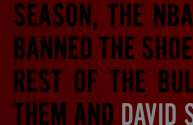
DAVID STER
EVENTUALLY $.,

DOLLARS
HOWED
ON THE SCREEN
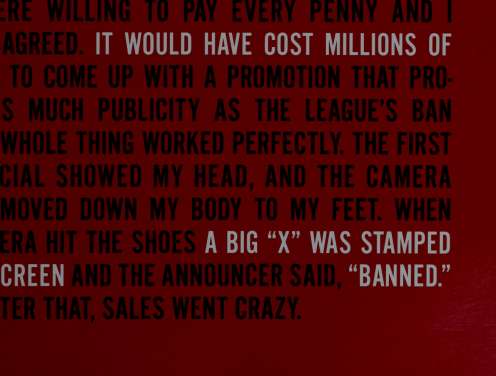
PUBLICITY AS THE LEAGUE'S BAN WORKED PERFECTLY. THE FIRST MY HEAD, AND THE CAMERA MY BODY TO MY FEET. WHEN
THE ANNOUNCER SAII ES WENT CRAZY.
BIG "X" WAS STAMPED
"BANNED."

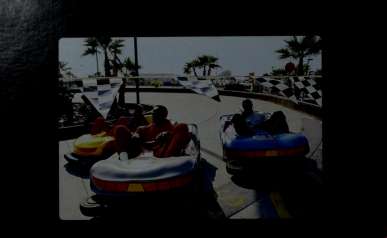
MY ATTITUDE GOING INTO TRAINING CAMP AS A ROOKIE WAS TO IMPRESS.

wanted to impress my teammates, my coaches, the owners, everybody. I wanted them to say, "This kid is special. This kid has the right mind, the right skills, the right motivation." All my effort that first year was geared toward proving myself. I went as hard as I could all the time. I tried to win every drill, every scrimmage. I tried to dominate, but never vocally. I felt until I earned the right to speak I wasn't going to say a word. I was the second-highest-paid player on the team, but I never wore that on my sleeve. I didn't go out and buy cars and clothes like rookies today. I always tried to dress nice, but I never wanted to be the best-dressed. Not even close. I lived very modestly. Away from the game I wanted to fit in. But on the court I was all business. I wanted to stand out.
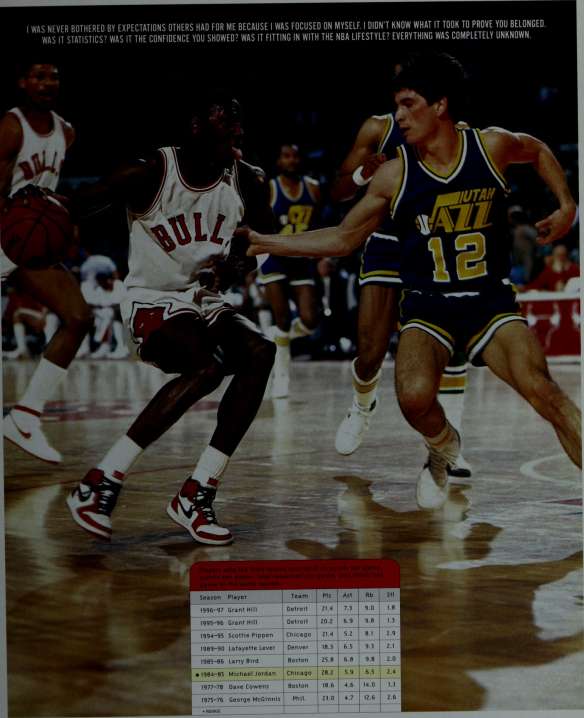
THE 1984-85 BULLS TEAM HAD AS MUCH RAW TALENT AS ANY OF OUR CHAMPIONSHIP TEAMS.
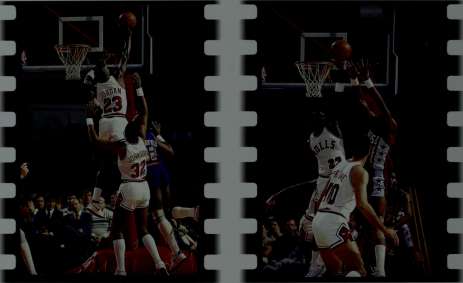
BUT IT WAS ALL POTENTIAL.
ncckjvwnnn nAwc rnn7ikir nnn uirrikic fkjkjic w
M^osi of them didn't have any idea how to win. Some were looking for that kind of" leadership from me, others were not. Guys like Sidney Green, Orlando Woolridge, and David Greenwood were naturally talented, but they weren't basketball players. Dave Corzine was a basketball player. He couldn't run or jump, but he knew how to play the game. Rod Higgins was a solid all-around player and he understood the game. Greenwood? He was in it for the money. He never wanted to
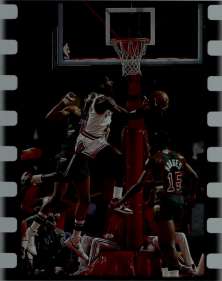
push himself beyond his comfort zone. I remember twisting my ankle in practice the day before a game. It swelled up pretty good, but I never thought it was bad enough to prevent me from playing. Greenwood walked by as I was getting treatment and said, "With that ankle it would be a week before I played." The idea of not playing never crossed my mind. I was thinking about how I would compensate, how I would get around the fact I wouldn't be 100 percent. I noticed right off that my appetite for success was much bigger than that of a lot of players. I was motivated because I wanted to succeed. I
couldn't miss a practice much less a game. From my first day in the league to my last, I always felt I had a lot to prove. The only difference between 1984 and 1998 was the expectations of everyone around the game. But my expectations never changed. The better I got the better I wanted to become. But there were a lot of things going on with that first team. Everyone knows there were players doing drugs. I still mingled with my teammates, but I wasn't going where they were
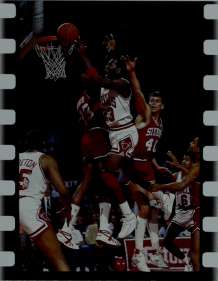
going. And I wasn't tempted by what was going on around me. I was surprised by some of the people doing drugs, but the act didn't shock me. I remember thinking, "So this is what professional basketball is about. Doing drugs and trying to play the game." I could see how players could get misguided if they were weak-minded. I wasn't a snitch and I never allowed the extracurricular stuff to break my bond with the team. I decided I was going to go out there and let the fans decide the winners and losers. My father always told me, "The cream always rises if you put forth the effort." That was my focus.
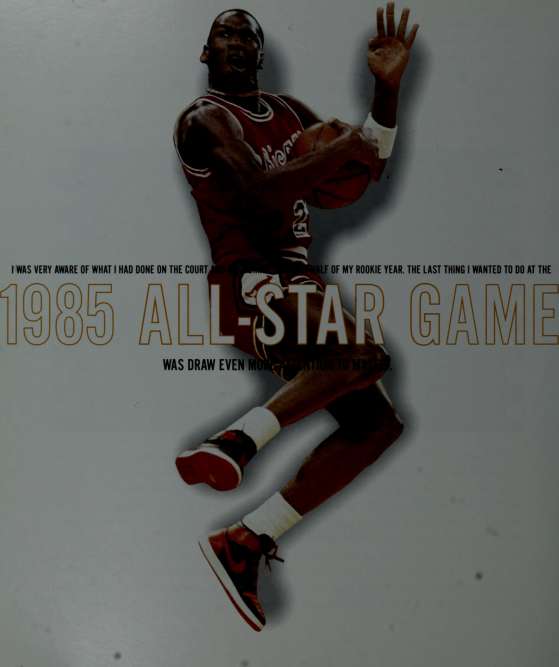
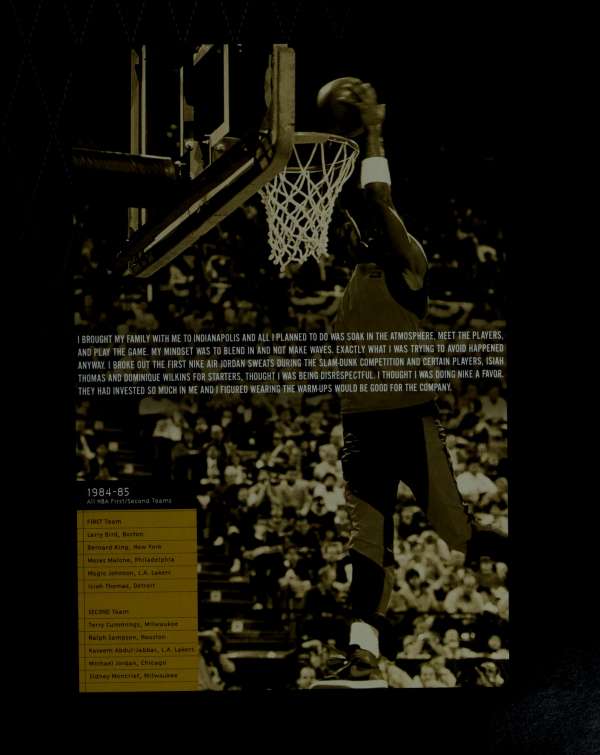
THERE WERE OTHER INCIDENTS, IF YOU WANT TO CALL THEM THAT,
WHERE I WAS PERCEIVED ONE WAY
WHEN I WAS THINKING THE COMPLETE OPPOSITE.
SOMEONE SAID I DIDN'T SAY HELLO TO ISIAH IN AN ELEVATOR.
P U Ir E N S E
HOME
i
GUEST
- IZD
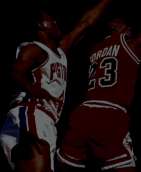
TUM
4
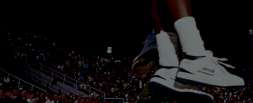
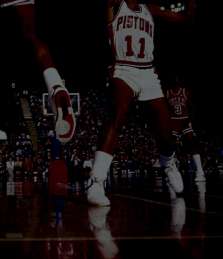
^^ut there was a reason. I was in an elevator full of great players and I was afraid to say anything. I didn't want to come off as being too confident, so I didn't say a word. The next day I'm back in Chicago and a reporter comes up to me after practice and tells me about the freeze-out. He said Isiah, George Gervin, and some iier players were laughing about
\K~<-\
how they had tried to embarrass me during the game by freezing me out, or not giving me the ball. I didn't notice a thing, to tell you the truth. But that incident was one of the most painful experiences of my life to that point. I was so disillusioned I didn't know what to do. I called my parents and talked to them for a long time. I knew that everything
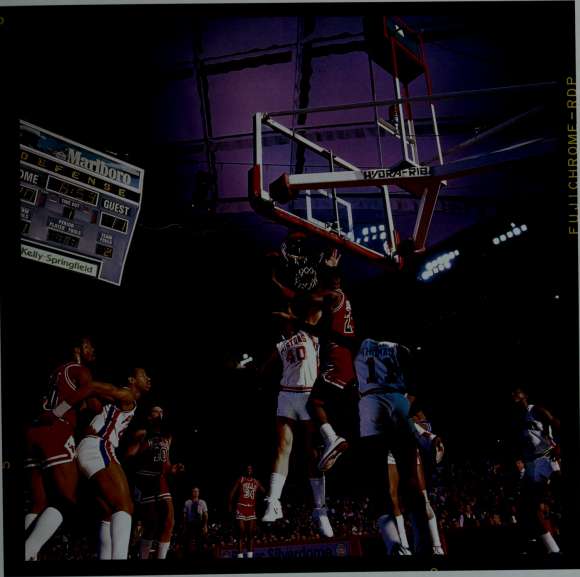
happened for a purpose and I could either learn from the experience or fight it. I decided to do both. The next night we played Detroit at home and I played like I was possessed. We beat the Pistons in overtime in a very physical game. There were a couple near fights and I had my first real run-in with Bill Laimbeer. But there was no way I was going to let us lose
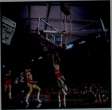
that game. I scored 49 points and had 15 rebounds. I also got a piece of Isiah's last-second shot that could have tied the game. I guess you could say our rivalry with Detroit suddenly had a foundation. For the next seven years I would do all I could to build upon that foundation. I'm pretty sure Isiah and Laimbeer had the same idea.
WHAT WENT ON BETWEEN JERRY KRAUSE, JERRY REiNSDORF,
AND ME DURING THE 1985-86 SEASON WAS SOMETHING I NEVER GOT OVER. I NOW LOOK AT THAT SITUATION AS A TEST, MAYBE THE BIGGEST TEST OF MY PROFESSIONAL CAREER. BUT IT ALSO GAVE ME A VERY CLEAR VIEW OF KRAUSE AND REINSDORF.
Special

64 82
1984-85/1986-98
7 848
THEY WERE BUSINESSMEN
THEY WERE NOT SPORTSMEN
AND THEY DIDN'T HAVE A TRUE APPRECIATION FOR THE GAME.
broke the iu\ it ular bone in m) left foot during j game at Golden State in the third game of in) 1 second season.The initial X-rays didn't show a thing. 1 kepi taking treatment and trying to play, hm I could hardly walk. A CAT scan, which showed the bone in layers, eventually detected the break. I couldn't believe it. I went home and (ried for days. I was so depressed my father flew in from North Carolina because my parents were worried about me. After seven weeks, I was told the crack hadn't healed enough. I was demoralized all over again because I thought for sure I'd be back by the All-Star break. But I convinced the doctor to give me a removable splint instead of another cast. That's all I needed. I went back to North Carolina where I was taking a class and I started speeding up the rehabilitation process. The Bulls had me see two orthopedic specialists in addition to John Hefferon, the team's orthopedic surgeon. On February 12 I was back in Chicago for an evaluation. But Reinsdorf and Krause still didn't want me to play. We had a late-night meeting with all the doctors on a speaker phone. None of them wanted to be the one to say it was safe for me to play. So I went back to North Carolina and started playing anyway. I shot baskets for a few days, played some light one-on-one, then two-on-two, then full-court games. In a four-week period I played myself back into shape and no one knew a thing about it. The next time I came back the doctors couldn't believe the results of the strength test. My left leg was actually stronger than my right. So we had another meeting, same office. Reinsdorf, Krause, and I sat down at the table. Before anybody could say a word, I said, "I don't want there to be any confusion." I reached into my briefcase and pulled out a tape recorder and
set it right in the middle of the table. Once again, the doctors backed off. Dr. Stan James told us there was a 10 percent chance I could break the bone again. That was all Reinsdorf and Krause wanted to hear. The team was lousy and they were thinking about a lottery pick. They were very careful not to say those exact words, but they might as well have written them on the wall. That's when the argument began. Krause said, "We're not taking the chance. What are you thinking?" I said, "My thinking is there's a 90
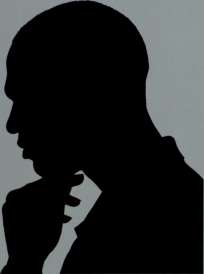
percent chance I won't break it again." But I knew those guys had a completely different agenda. And I broke it out right there in front of them: "You're trying to lose games so you can get a better draft pick." That hit a nerve with Krause. This was right around the time Tylenol capsules coated with cyanide were found. So Reinsdorf gives me this scenario: "What if I gave you 10 pills in a bottle and one of them was coated with cyanide? Would you reach in and take the risk of grabbing the wrong pill?" I thought for a moment and said, "You know
what, Jerry, that's a hell of an analogy. But my answer is this: it depends on how bad the headache is." Reinsdorf wanted a 100 percent guarantee, but I didn't have a 100 percent chance of remaining healthy when I broke the bone in the first place. Besides, if it broke again I'd have plenty of time for surgery before training camp. If I didn't test the foot now and it broke later on, then I'd lose another season. But I was in this battle all by myself. Even Falk was on their side. Everyone was worried about the Golden Goose while I'm worrying about life at that moment. By the end of the night, Reinsdorf and Krause agreed to let me practice at full speed, but they limited my game time to seven minutes a half. I could practice two hours a day, but I couldn't play more than seven minutes? These were the same guys who called me the greatest practice player they'd ever seen. Reinsdorf and Krause made up this ridiculous system that increased my time by a minute per half each game. It should have been embarrassing for the entire league much less the team. One night we're playing at Indiana and we have the ball with 31 seconds left in the game and we're losing by a point. The night before Reinsdorf had called coach Stan Albeck and told him if I played one minute too long he would be fired. Now my minutes are done. If two seconds click off the clock, then my time rounds up another minute. Stan takes me out of the game. The fans are going crazy. They're yelling at Stan, calling him names. I'm at the end of the bench and I'm furious. John Paxson eventually hit a game-winning shot at the buzzer. But right there I knew all I needed to know about Reinsdorf and Krause.
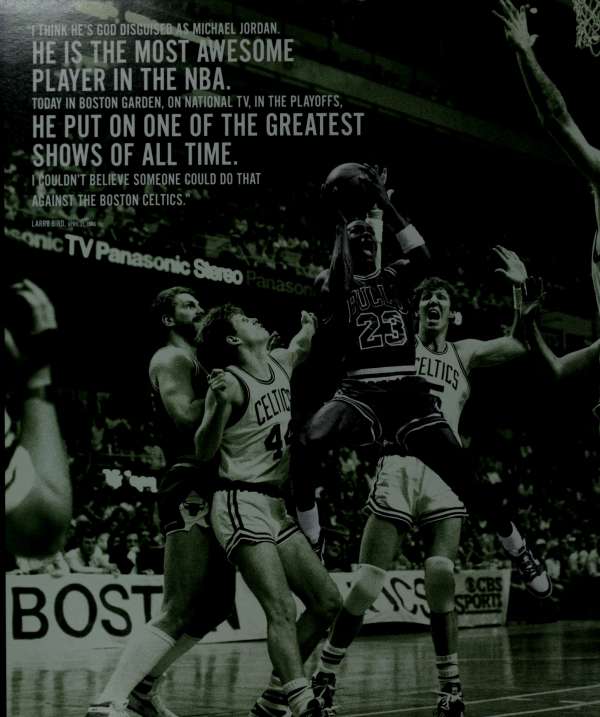
I REMEMBER READING WHAT LARRY SAID ABOUT THAT GAME.
I REALLY COULDN'T BELIEVE HE WOULD SAY SOMETHING LIKE THAT.
HERE WAS A GUY WHO HAD BEEN IN THE LEAGUE SEVEN YEARS AND WAS IN A CLASS I WAS TRYING TO ENTER. TO THAT POINT I DON'T THINK I HAD EVER PLAYED A GAME AS GOOD AS THAT ONE. BUT I KNEW I STILL HAD A LONG WAY TO GO.
< Lyarry Bird's comments gave me credibility. Up to that point I was still perceived as a hotshot rookie, not a real player. When Bird acknowledged my performance, I became a player. I still wasn't up to his level, but I was now a player who was marked as a star, a potential Hall of Famer depending upon how I took those comments. At the time, I really didn't understand what his statements meant to me. In other words, his praise wasn't going to change how I would try to establish myself as a player. I didn't see myself in the same way Larry did. If I did, I probably wouldn't have accomplished as much as I did later. I took those words as a compliment and nothing more. He confirmed I was on the right path, but nothing he or anyone else might have said would have altered that path. Off the court, Larry Bird intimidated me because of who he was, what he had accomplished, and the fact that he was Larry Legend. I felt the same way
about all the stars at that time: Magic Johnson, Julius Erving, all of them. I wasn't scared of them on the court because I believed I had the skills to compete with anybody. But their presence off the court intimidated me. Now that I look back I realize how much I had to learn to attain their level. I'm glad I didn't know then how much I had yet to learn. If I hadn't evolved at my own pace, I wouldn't have been able to paint the tiny details that defined my career. I remember every little step, every little crease. Now when I look back I see one big beautiful picture. Some of these young kids just have that big blob of paint without any detail. Their careers are just a mass of color without any definition because they haven't taken the time to work on the details or they don't appreciate or understand the process.
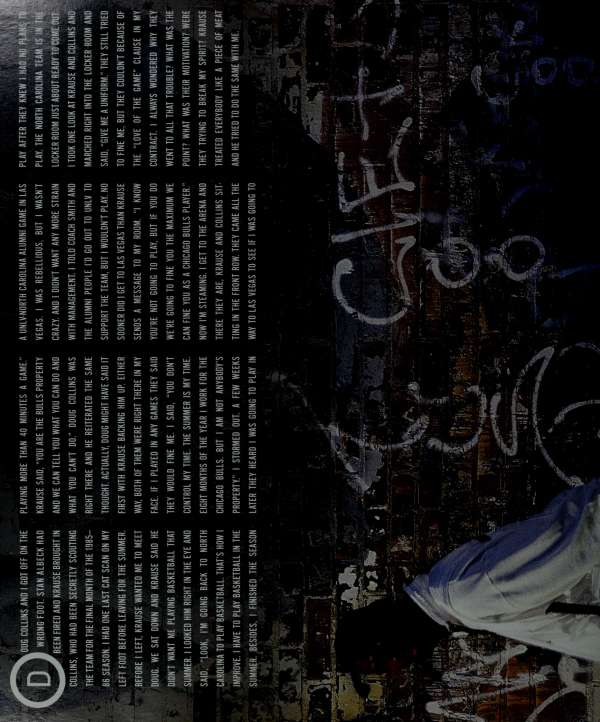
W4m
CO


' 7-



(|)T WOULD HAVE BEEN TOUGH, IF NOT IMPOSSIBLE, TO OVER 37 IS SIGNIFICANT. THINK OF IT THIS WAY: IF I SCORED KEEP SCORING LIKE I DID DURING THE 1986-87 SEASON. I 32 ONE NIGHT THEN I HAD TO SCORE 42 THE NEXT NIGHT
ATTACKED FROM THE OPENING TIP UNTIL
THE LAST WHISTLE FOR 82 GAMES. THAT
WAS MY MENTALITY. IN TERMS OF PHYSI-
CAL TALENT WE PROBABLY HAD LESS ON
THAT TEAM THAN ANY OTHER BULLS
TEAM I PLAYED ON. OUR STARTING LINE-
UP WHEN THE SEASON OPENED WAS
STEVE COLTER AT POINT GUARD, EARL
CURETON AND CHARLES OAKLEY AT
FORWARDS, AND GRANVILLE WAITERS AT
CENTER. I KNEW I NEEDED TO SCORE IF
WE WERE GOING TO BE SUCCESSFUL. I'M
PRETTY SURE DOUG COLLINS FELT THE
SAME WAY. I HAD ONE STREAK OF NINE
STRAIGHT GAMES WITH 40 OR MORE
POINTS. YOU HAVE NO IDEA HOW MUCH
ENERGY IT TAKES TO SCORE 40 POINTS

JUST TO GET EVEN. BUT THAT WAS A
DIFFERENT ERA. VERY FEW TEAMS WERE
AS SOPHISTICATED DEFENSIVELY AS
THEY ARE TODAY. AND NO TEAM, WITH
THE EXCEPTION OF DETROIT THE NEXT
SEASON, GEARED ITS ENTIRE DEFENSIVE
GAMEPLAN TO SHUTTING DOWN ONE
PLAYER. THAT'S WHY I'VE ALWAYS SAID
WILT CHAMBERLAIN NEVER COULD
AVERAGE 50 POINTS A GAME TODAY. HE
COULDN'T EVEN LEAD THE LEAGUE IN
SCORING. WHAT COULD I HAVE SCORED
PLAYING AGAINST JOHN STOCKTON EVERY
NIGHT WITH NO DOUBLE TEAMS? I'D
STAND IN THE POST AND SCORE EVERY
TIME I TOUCHED THE BALL THAT'S NOT
MUCH DIFFERENT THAN WHAT WILT DID.
ONE NIGHT. THE DIFFERENCE BETWEEN AVERAGING 32 YOU WANT TO SEE WILT CHAMBERLAIN IN TODAY'S GAME?
POINTS A GAME OVER AN ENTIRE SEASON VERSUS A LITTLE LOOK AT SHAQUILLE O'NEAL. THAT'S A MODERN VERSION.
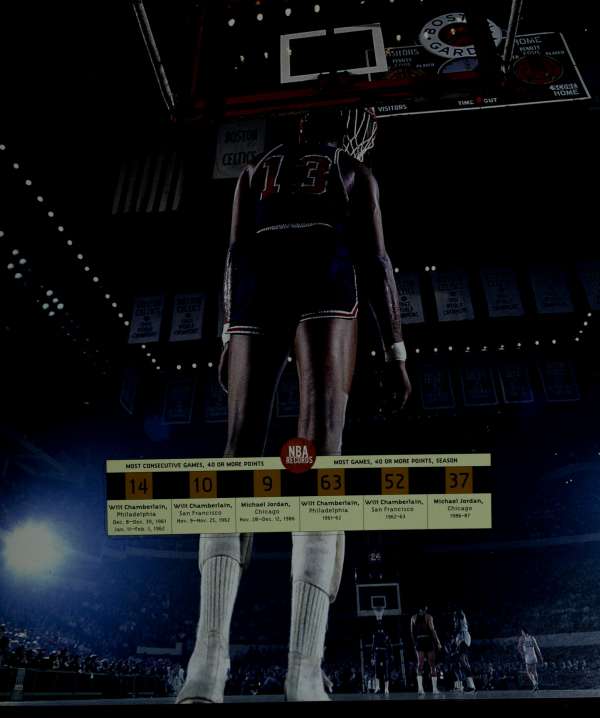
wasn't until 1988 that I understood the level I was playing at and the magnitude of the business decisions off the court. Before the 1987-88 season I was trying to make my mark. I was focused on proving I belonged in that upper echelon with Magic and Larry. Off the court, my first deals were starting to come up for renegotiation. I was making the transition from Coca-Cola to Gatorade and there were more deals on the table at substantially more dollars. By 1988 I had a very clear understanding of the business of basketball. I had tried to learn as much as possible about every deal. From the initial concept through the negotiations and into the contract phase, I wanted to understand the positions we took and why we took them.
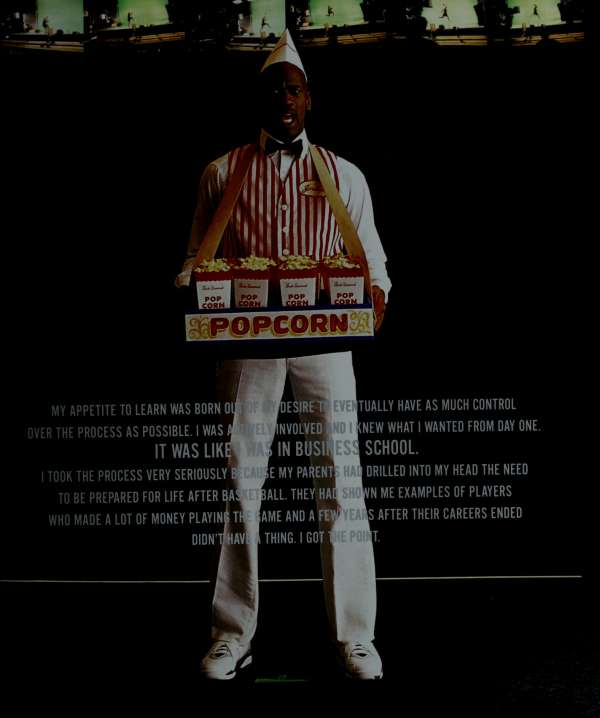
Even at the end of my career I was always comparing myself to other players. I wanted to know I stood, how I matched up, what I needed to work o . anted to be
It never had anything to do with money or busir The game is what mattered to me. In the early years I con to Magic and Larry. What could I do to elevate my game pa
V
' I I k!
I realized defense could be my way of separatin I decided I wanted to be recognized as a player
the game at either end of the floor. The in me that they didn't see in Magic or Larry wa;
They had great talent, but in terms of raw athletic ability I think I had a little more. To some extent I think it was hard for people to believe anyone who jumped and dunked could also be a complete player. But that's what I did at North Carolina and mat's what I was trying to do in the NBA. After the 1987-88 season the critics had to say,
lence at both ends oi the court.
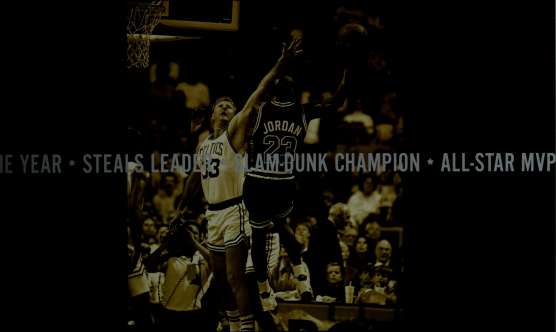
He's not just a scorer." Now when they talked about Magic and Larry they also had to talk about defense. I felt like I made the separation, at least individually, to some extent that season.
But I knew I'd never completely be recognized :ir equal until we won championships.
ong about the Charles O
Oakley was a tough rebounder and he gave us a physical presence against teams such as Detroit. He was young, hard working, and unselfish. He had every attribute you wanted in a teammate. Cartwright had been injured for years and he was on the back end of his career. I loved Charles like a brother, still do, and I hated to see him traded. I felt like we were giving away too many years trading for an older guy who couldn't stay healthy. I didn't know anything about Bill's personality. Would he stand up against the Pistons? I thought we needed the kind of toughness Charles gave us because we still were trying to break
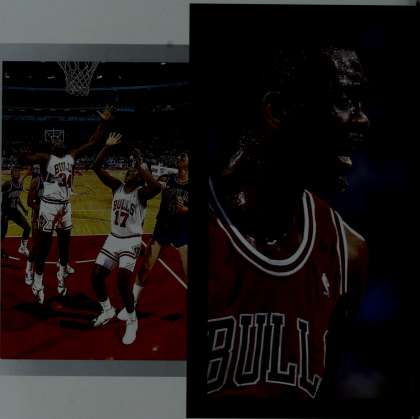
Laying Charles on the t|
ley-Bill Cartwright trade
through Detroit. But it turned out to be an important trade given where we were headed as a team. We struggled through the 1988-89 season trying to fit a low.post player into an offense that basically revolved around my game. That was still a year before Phil Jackson instituted the Triangle Offense. Bill didn't know how to adjust to a player like me and I didn't know how to adjust to him. Personally, we had our problems in the beginning. I had to learn how and where to deliver the ball to Bill. It took awhile before I started to appreciate what Bill gave us and how he could compensate for the loss of Charles.
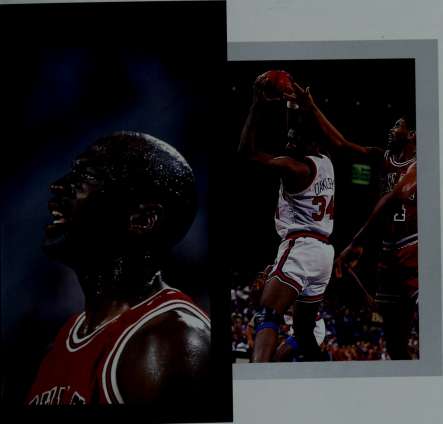
im,but Bill i
difference,
BY THE START OF THE 1988-89 SEASON THE CHALLENGE WAS NO LONGER AS MUCH PHYSICAL AS IT WAS MENTAL I WAS PERCEIVED AS A GREAT PLAYER, BUT THE CRITICISM WAS STILL THE SAME:
THE BULLS WILL NEVER WIN A CHAMPIONSHIP WITH MICHAEL JORDAN LEADING THE LEAGUE IN SCORING.
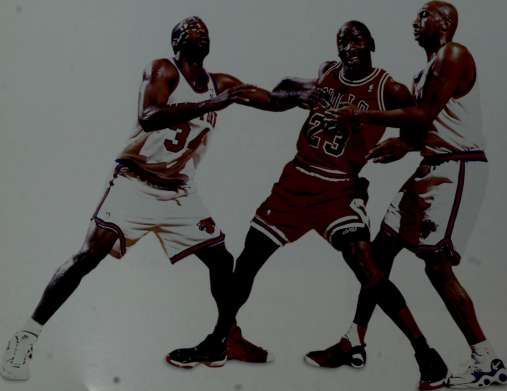
T^hey pointed to Wilt, Dominique Wilkins, Bob McAdoo, guys who scored a lot of points but played on teams that weren't nearly as successful as those players were individually. Kareem Abdul-Jabbar was the only player since George Mikan to lead the league in scoring and take his team to a championship. A non-center never had won both in the same season. History presented a great argument for those looking to criticize what I was doing on the floor. Because I was perceived as being more successful than the team, the perception held that I didn't make the players around me better. But I knew what I could do on the court. That's why the challenge
became more mental. I had to incorporate my ability into a system that made the team better. Doug never really had a system because he relied on individual talent. In that sense, I needed the right players around me to make the team better. That started happening when Horace Grant and Scottie Pippen began developing and Bill became a low-post threat. But it didn't happen overnight. When Oakley left and Cartwright arrived, I knew I would have to rebound more. Later, when Scottie and Horace became starters, I knew I would have to find ways to get them into the offense. Doug tried everything including moving me to point guard late in the season.
That was the first time all season everything started to click. We won 11 of 14 games during one stretch and I had 10 triple doubles in 11 games. I could see the whole floor and teams no longer could key on me defensively. For the first time in my career we had other scoring options and teams had to respect my teammates. But there was a lot of friction on the team, particularly between Doug and some of the younger players. Still, I knew we had taken a step forward. We lost all six games we played against Cleveland and all five against Detroit during the regular season. But by the time the playoffs started I really thought we could beat anybody.

TEAM IMPROVEMFN1
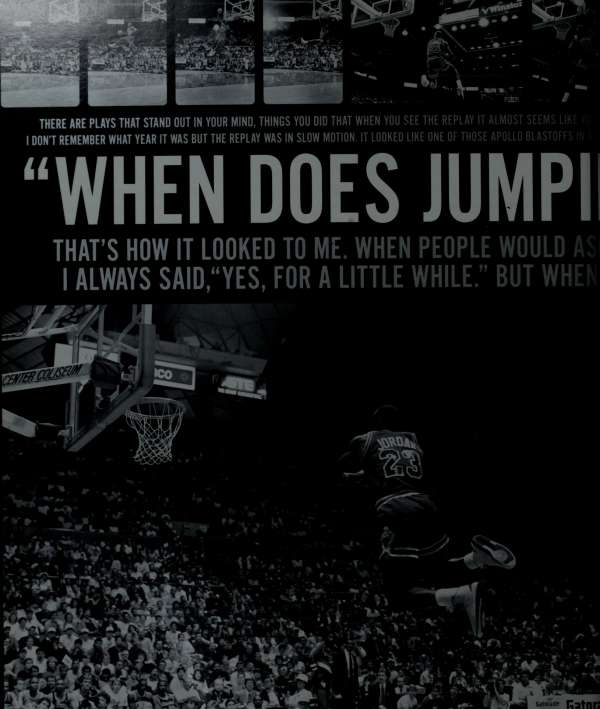
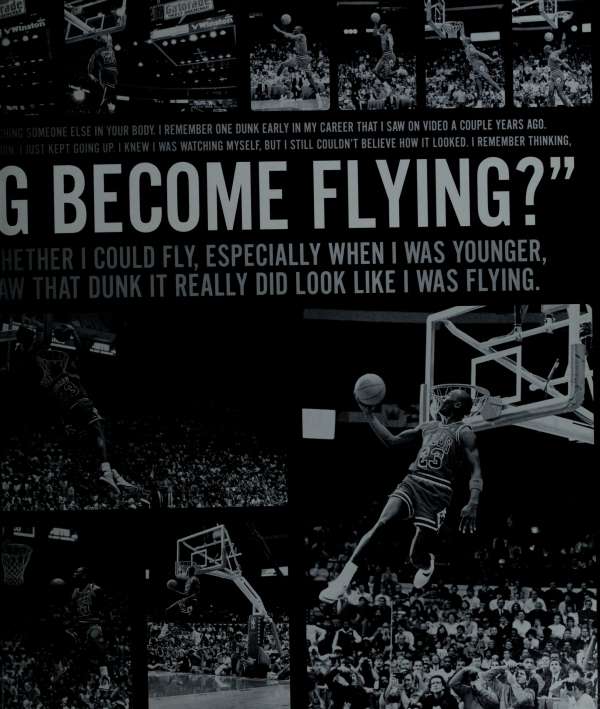
never considered the negative consequence of missing the last shot in a game. I missed my share, but I always had complete confidence the ball was goii Mine went on and I had more success in those situations, I became more comfortable with the role. Even later in my career, 1 always thought of Coach S |sffnes or in situations that demanded a game-winning shot. We had just called our last timeout in the NCAA Championship game against Georgelou n in I'))
tJ . ' ■ > r,- - r ji ' ■


was in that situation, I thought about those words: "This is fun." That's exactly what I thought about in the timeout before the shot over Craig Ehlo that won G 5 of the 1989 first-round playoff series against Cleveland. I had missed a free throw and a potential game-winner in Game 4 in Chicago and we ended up losing overtime. That was about as low as I had ever felt in basketball. It reminded me of being cut from the varsity in high school. We had won 47 games during the r

Nov. 11, 1984 vs. Indiana
four seconds left
Dec. 7, 1984 vs. New York
:onds left
March 26, 1985 vs. Indiana
April Z4, 1985 vs. Milwaukee
Oct. 25, 1985 vs. Cleveland
Hits second of two free throws for the victory Final Score: 116-115
Nov. 11, 1986 vs. Atlanta
Driving layup with nine seconds left Final Score: 112-110
Nov. 21, 1986 vs. New York
Scores final 18 Bulls points including a running 18-footer with one second left Final Score: 101-99
Feb. 12, 1988 vs. Milwaukee
Drops two free throws with two seconds remaining Final Score: 95-93
April 3, 1988 vs. Detroit
Two free throws with four seconds left Final Score: 112-110
April 15, 1988 vs. New Jersey
Hits jumper with 20 seconds left Final Score: 100-99
Feb. 16, 1989 vs. Milwaukee
20 footer with one second remaining Final Score: 117-116
May 7, 1989 vs. Cleveland
"The Shot" over Craig Ehlo at the buzzer to win the first-round playoff series Final Score: 101-100
May 19, 1989 vs. New York
Two free throws with four seconds left Final Score: 113-111
u could determine or dictate the result of a game I was playing. In Cleveland, none of us believed we were going to lose, despite the records. We could determine

come Thai was the attitude I had ever since I was cut from the varsity team in high school. That attitude became a part of me. I can't be successful without approach. When I was in a situation w here everyone knew I was going to take the last shot, I enjoyed looking in my opponent's face. They knew it, I knew it,
fans knew it.The challenge in that moment is making it happen.
f
Patrick L\\ mg and I joke about it but he never has been able to overcome that defeat the 1*982 NflCAA Championship game. He has tried, but he never has been able to break through against me. He never In at me head to-head in a playofT series, either. He might have won some games in the regular season, but when it mattered Patrick never got past me.
If
CHARLES BARKLEY, KARL MALONE, JOHN STOCKTON, TOO.
i KEY WERE MY PEERS IN MY TIME JUST AS MAGIC JOHNSON AND LARRY BIRD
WERE THE GUYS I WAS TRYING TO GET PAST EARLY IN MY CAREER.
J M • • *
DO I FEEL SORRY FOR THEM?
NO.
I NEVER COULD FEEL SORRY FOR THEM BECAUSE THAT WOULD SHOW I HAD LOST IE OF THE EDGE I HAD AGAINST THEM. PATRICK AND I TALK ABOUT HOW OUR CAREERS CROSSED OVER THE YEARS. BUT THERE'S NOTHING BUT LOVE BETWEEN THE TWO OF US.
HE'S A GREAT FRIEND.
ASKED ME ABOUT MY PLANS. GOING TO RETIRE. HE SAID,
"YOU CAN'T RETIRE. YOU HAVE TO COME BACK. I'VE GOT TO BEAT YOU."
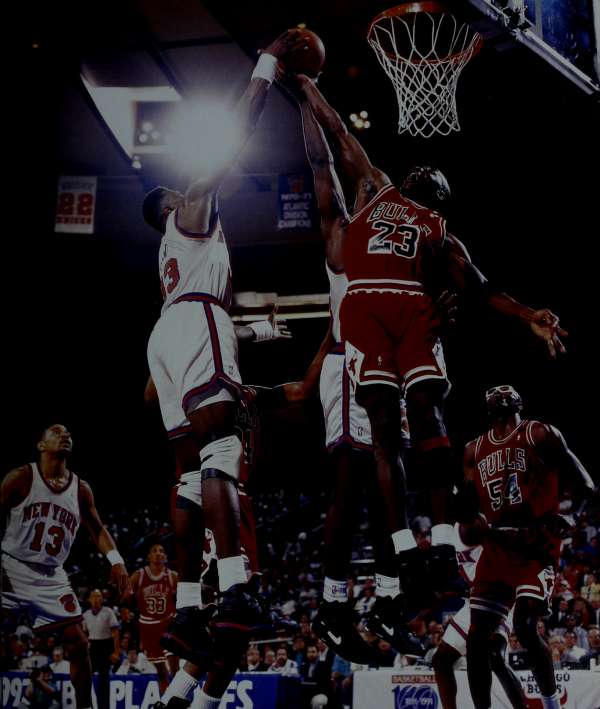
^^etroit taught us how to maintain our cool and to play through situations without losing sight of our objective. Their game was to intimidate, to divide, and to conquer an otherwise united team by forcing players to react emotionally. The Pistons tried to get you to play angry, which meant you were playing out of control. All that pushing and shoving was their way of getting the minds of opposing players off the gameplan. That's what Dennis Rodman was all about. He would try to get
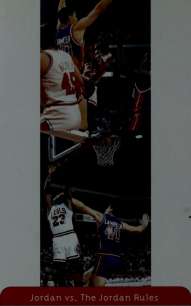
Instituted after 59-point performance in 112-110 Bulls victory at Detroit April 3, 1988
vs. League
inside a player's head and take that player out of the game mentally. Once he had distorted the guy's thought process, the physical part was easy. Chuck Daly, who coached Detroit at the time, had his own plan for me. The Jordan Rules were a set of defensive principles the Pistons applied to stop me. As far as I could tell the plan involved running as many players as possible at me whenever I touched the ball and then hitting me as hard as possible every time I took a shot. Some rules.

IF YOU BOUGHT INTO THEIR TACTICS,
YOU WOULD BECOME VINDICTIVE BECAUSE OF ALL THE STUFF THEY WERE DOING TO YOU.
SO THEY FORCED US TO LEARN
HOW TO KEEP OUR COMPOSURE.
m
1

0 %:
A
4 %
\
\

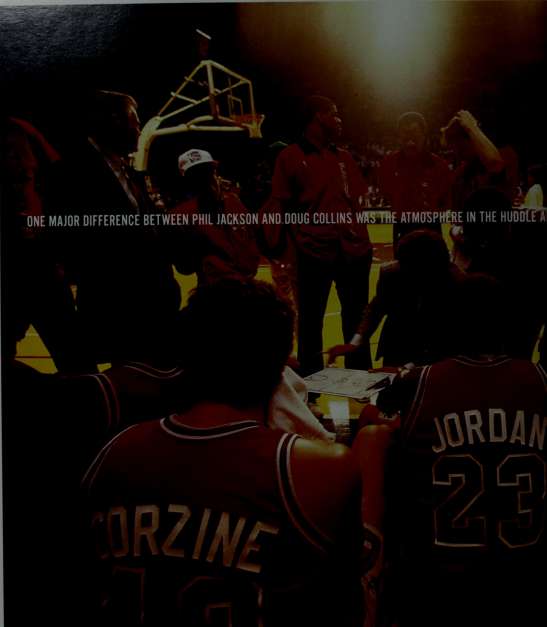
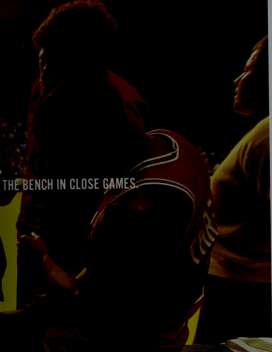
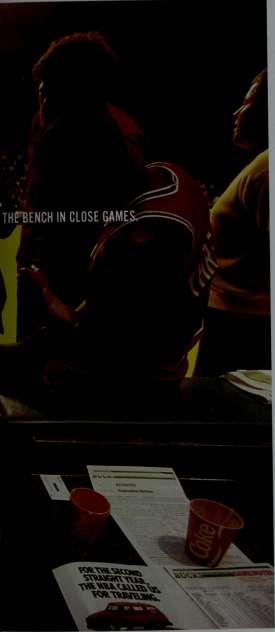
^)ith Doug you could feel the tension, while Phil was poised at all times. Doug was more emotional. He wasn't afraid to show you exactly how he was feeling. As a player you connected with the atmosphere the coach created. With Phil it was like we were in harmony with each other in the heat of the battle. We were comfortable not only with each other but also with the situation no matter how difficult the moment. We were able to find peace amid the noise, and that allowed us to figure out our options, divine solutions, and be clear-headed enough to execute them. That's what Phil Jackson brought to the Chicago Bulls and that's what we all connected with. That's one of the reasons we became so successful for so long. And that's why we eventually cut the heart out of Detroit. That presence, that peace of mind, that connection between the team and the coach was more valuable than anyone possibly could know. But that was Phil.That was who he was at the core of his being. It wasn't contrived.The Zen Buddhist philosophy, the middle-road approach to life, Phil lived that philosophy every day and he brought elements of that philosophy to the team. He taught us to find peace within ourselves and to accept the challenges, whatever they may be at whatever moment they appear. It wasn't just an intellectual passing out information. We were able to see the embodiment of those thoughts every day. Phil lived by those principles. And nothing changed with all the success. Even as we won championships, Phil remained the same within the team.

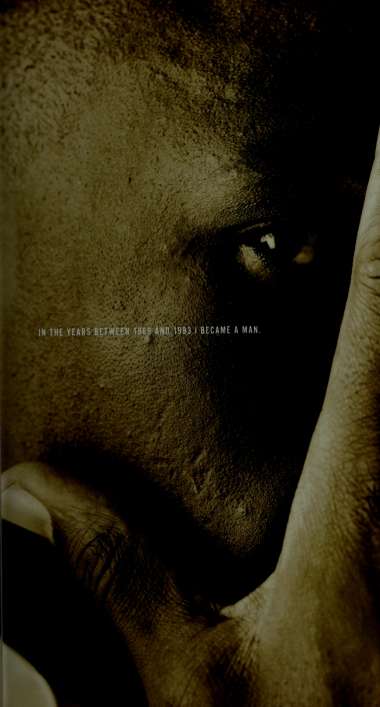
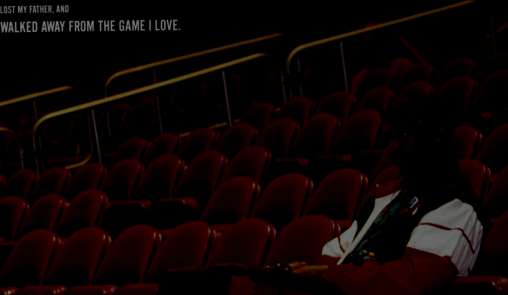
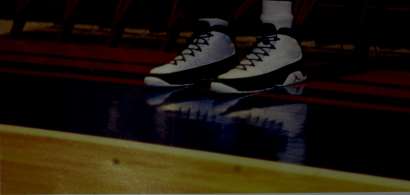
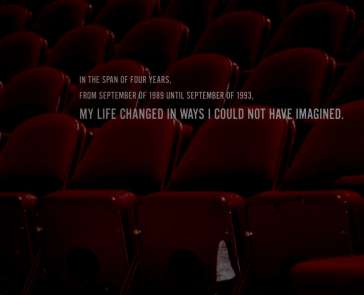
^^^n some cases, particularly with the births of my children, the highs were higher than ever. But so too were the lows. I learned what it was like to be criticized, to have your life put under a magnifying glass for the purpose of exposing some deep dark secret or to find that one indiscretion that would knock me off the pedestal others had created for me. On the basketball court, I elevated my game to meet the demands of our team and my own expectations. The game began to become more mental than physical, the challenges more narrowly focused. Off the court, the balance and harmony created by the presence of my family got turned upside down with my father's passing. I had been playing a kid's game and leading a kid's life. By the time I retired from basketball in 1993, I was a man leading a man's life.
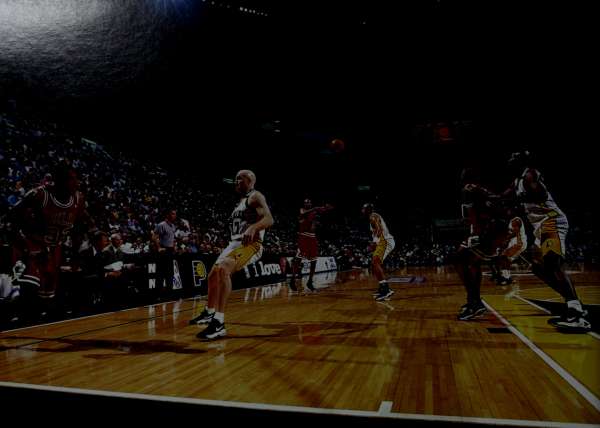
IN THE BEGINNING I FOUGHT THE TRIANGLE.
J?
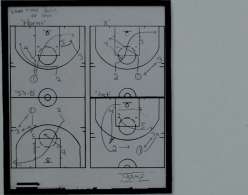
thought Phil believed all the talk about not being able to win a championship with me leading the league in scoring. I thought he went to that offense to take the ball out of my hands. For the first time since college, I wasn't the first option. The first option was to throw the ball inside to either Horace or Bill. I wasn't alone in fighting the system. Everyone hated it in the beginning because it was so difficult to operate. But Phil never backed off. He and Bulls assistant coach Tex Winter, who invented the system, forced the offense on us until we finally started to develop a rhythm within the system. I can't say it worked all the time, but at least it kept everybody occupied and involved. The Triangle allowed all of us to break
down our defender before the rest of the defense realized what was happening. Because of all the movement involved in executing the offense, the system forced defenders to be honest. They couldn't double me as easily because I usually was moving without the ball. The offense was designed to make every player a scoring option.That's where Scottie, Bill, and a sidekick like John Paxson became so important. When Paxson's man started to become dishonest, boom, John would knock down a jump shot that would extend the defense even more. As a result, I had more room to operate. Detroit's "Jordan Rules" became less effective because I had too many options.

ALWAYS "AD THE FADEAWAY BUT I DIDN'T HAVE TO USE IT EARLY IN MY CAREER BECAUSE I WENT ONE-ON-ONE AGAINST MY OPPONENT. I COULD FACE
UP TO THAI PLAYER AND BREAK HIS DEFENSE DOWN WITH MY QUICKNESS. THE PISTONS CHANGED THE WAY I ATTACKED. THEY SAID, "WE'RE NOT GOING TO LET YOU ISOLATE. AND ANYTIME YOU START TO DRIVE WE'RE GOING TO CLOSE DOWN THE LANE AND WE'RE GOING TO BEAT YOU UP." THEY TRIED TO BEAT ON ME FROM THE SECOND I TOUCHED THE BALL ALL THE WAY THROUGH THE MOVE, ESPECIALLY / * IF I WAS GOING TO THE BASKET. THE PURPOSE OF THE TURNAROUND JUMP SHOT WAS TO AVOID GIVING DEFENDERS A CHANCE TO SEE ME IN _ . FRONT OF THEM AND REACT. WHEN I GOT THE BALL ON
THE BLOCK I WAS IN THE DANGER ZONE. I COULD REACT BEFORE THEY COULD SEND - HELP.. DIDN'T HAVE THE BALL IN FRONT OF THEM
SO THEY COULDN'T SEND PLAYERS AT ME. * A YOUNG
SUMMER WHY EVERYBODY DIDN'T KNOW I WAS GOING ONE. COMING OUT OF HIGH SCHOOL EVERYONE IS INDI-DEFENSIVELY FOCUSED. THERE AREN'T MANY g COLLEGE SCHOLARSHIP ON DEFENSE. NOW V^ OR NORTH CAROLINA, WHERE THEY ft
/Ik
YOU PROBABLY CAN'T SCORE LIKE YOU
YOU HOW TO DEVELOP OTHER
WITHIN A SYSTEM AND YOU'RE NOT
WERE AT THE HIGH SCHOOL /^
I
IS LIKE LEAVING HOME. THEY ABOUT THE GAME AND NOW YOU'RE
YOU HAVE TO PUT EVERYTHING WORK. YOU HAVE TO LEARN HOW TO AS A PROFESSIONAL YOU GET SOME ZONES, THE SHOT CLOCK IS 24 COLLEGE. BUT YOU HAVE TO THAT VARY FROM TEAM TO }A IF YOU'RE A STUDENT WON'T BE SATISFIED '
PLAYED THE GAME I WAS LEARNING. FOR ME,
N'T MANY J ^'^tfM
ill
FRONT OF THEM AND REACT. WHEN I GOT THE BALL ON HELP. I DIDN'T HAVE THE BALL IN FRONT OF THEM C PLAYER FROM DUKE ASKED ME OVER THE
ft
m

OF THAT OLD SECONDS, AND THE SYSTEMS LEARN HOW TO APPLY INDIVIDUAL TEAM FOR 82 GAMES. IT SOUNDS LIKE
BE A GREAT PLAYER BEFORE I BECAME VIDUALLY TALENTED, BUT NO ONE IS HIGH SCHOOL KIDS THAT GET A s YOU GO TO A GOOD SCHOOL, DUKE TEACH YOU THE FUNDAMENTALS. DID IN HIGH SCHOOL, SO THEY TEACH OF YOUR GAME. YOU LEARN TO PLAY AS SUCCESSFUL OFFENSIVELY AS YOU LEVEL. THEN YOU LEAVE COLLEGE, WHICH HAVE BEEN TEACHING YOU EVERYTHING OUT IN THE WORLD OF THE NBA. NOW YOU'VE LEARNED IN 21 YEARS TO
\t\ APPLY THAT KNOWLEDGE, BECAUSE INDIVIDUALITY BACK. THERE ARE NO AREN'T AS TIGHT AS THEY ARE IN TALENTS IN GAME SITUATIONS
OF THE GAME AND YOU'RE CONSTANTLY J SIMPLY WITH REACHING THE HIGHEST LEVEL ^ A ESPECIALLY LATER IN MY CAREER, THE CHALLENGE
AN OVERWHELMING CHALLENGE. TRYING TO GET BETTER, YOU OF BASKETBALL. AS LONG AS AND THE LEARNING PROCESS
WAS ALL MENTAL. THE PHYSICAL CHALLENGE WENT AWAY FOR ME A LONG TIME AGO. I PROVED I COULD TAKE OFF FROM THE FREE THROW LINE AND DUNK OR LEAD THE LEAGUE IN SCORING. AFTER THAT, THE CHALLENGES PECAME MORE AND MORE MENTAL FOR ME.
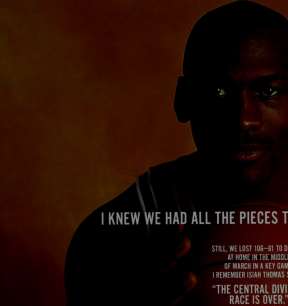
I KNEW WE HAD ALL THE PIECES TO
STILL, WE LOST 106-81 TO DETROIT AT HOME IN THE MIDDLE OF MARCH IN A KEY GAME. I REMEMBER ISIAH THOMAS SAYING
"THE CENTRAL DIVISION RACE IS OVER."
2 fl-*M
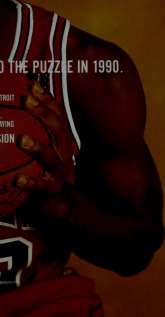
I'd had enough. I wanted to start dishing out the punishment instead of taking it all the time. -
I knew I had to get stronger.
I knew we never would lose to the Pistons again, or anyone else for that matter, when it counted.
he game at Cleveland, March 28, 1990, started out like any down on the floor and they were cheering. I looked over at Bulls
other game until I took a hard foul early from Hot Rod Williams. trainer Mark Pfeil and said, "These people are about to pay for it." I
He knocked me to the court and I was
down for a minute or two. As I was
lying there I could hear the crowd
cheering. I couldn't believe they would
prefer to see me hurt if that helped
them win a game. That wasn't good
sportsmanship. Every athletic event I
had ever been to when someone got
hurt and got up people clapped. The
9
*l
\
«4
MIN FG | FGA 3PT 3PTA FT FTA - RB AST STL PTS
50 I 23 37 I 2 ! 6 21 23 18 I 6 4 1 69
got up, made my free throws, and it
was like I was in a controlled rage from
that point forward. Doug could see it
because Doug kept giving me the ball.
was like a possessed man playing that
game. I went to work. It didn't look like
69 points because I was scoring in the
flow of the game. There were a couple
of other games where I played with
fans were still loyal to their team, but they understood a player's that kind of emotion. I had 49 against Detroit the first game after
well-being was more important than a basketball game. I was the 1985 All-Star Game. There were a few games where I played with
a kind of controlled anger. The Jerry Stackhouse game in Philadelphia agree with. During the 1989 playoffs I turned my ankle and Rick
in 1996 is another good example. Stackhouse had said he played me Pitino, who was the Knicks coach, went on TV and said he really
one-on-one and he didn't think I was
that good and that I just got all the
favorable calls. That set me off. I had
44 after the third quarter and called
off the dogs because we were so far
ahead. LaBradford Smith gave me 37
points one night in Chicago. We played
them at Washington the next night. I
told him I'd get 37 by halftime of that
.1 *>
it v

f * * •
BEST OF THE BEST
TOP

HIGHEST SCORING GAMES OF CAREER
cO Cleveland
New Jersey Washington Philadelphia cD New York
didn't think I was hurt. I made sure it
didn't look like I was hurt the next day
and dropped 47 on him. Jeff Van Gundy
did the same thing during the 1996
playoffs. He called me a con man and
said I lulled opposing players to sleep
by befriending them. That really irri-
tated me. I gave him 44 points the next
day and said, "Con that, little man."
game and ended up with 34 at half. There were a couple games Everyone asked me what I said to Van Gundy after the game. And
against the Knicks when their coaches made a statement I didn't that's about as nice a translation as I can give you.

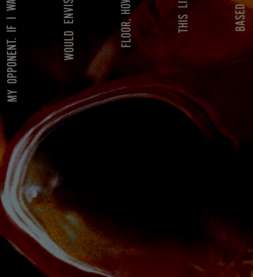
5 I
— «=x > 3E
lj- c=>
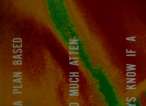

Q_
y—
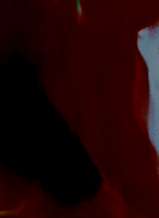
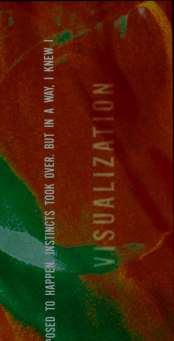
i
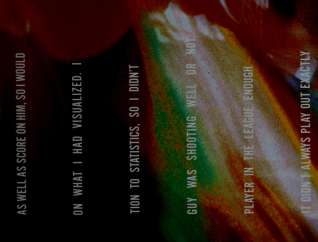



i

AWARDS
P" 1985 All-Rookie First Team
1985 Rookie ol the Year
1985 All-NBA Second Team
1985 IBM Award. All-Around Contribution to Team s Success
1987 Slam-Dunk Champion
1987 All-NBA First Team
1987 Scoring Champion
1988 Most Valuable Player 1988 Defensive Player of the Year 1988 Slam-Dunk Champion 1988 All-Star Game Most Valuable Player 1988 All-NBA First Team 1988 Scoring Champion 1988 Steals Champion
1988 All-Defensive First Team
1989 All-NBA First Team 1989 All-Defensive First Team 1989 Scoring Champion
1989 IBM Award, All-Around Contribution to Team's Success
1990 All-NBA First Team 1990 All-Defensive First Team 1990 Scoring Champion
1990 Steals Champion
1991 Most Valuable Player 1991 Scoring Champion 1991 All-NBA First Team 1991 All-Defensive First Team
1991 NBA Finals Most Valuable Player
1992 Most Valuable Player
• 1992 Scoring Champion
• 1992 All-NBA First Team
• 1992 All-Defensive First Team
1992 NBA Finals Most Valuable Player
1993 Scoring Champion 1993 All-NBA First Team 1993 All-Defensive First Team 1993 Steals Champion
1993 NBA Finals Most Valuable Player
1996 Most Valuable Player
1996 Scoring Champion
1996 All-Star Game Most Valuable Player
1996 All-NBA First Team
1996 All-Defensive First Team
1996 NBA Finals Most Valuable Player
1997 Scoring Champion 1997 All-NBA First Team 1997 All-Defensive First Team
1997 NBA Finals Most Valuable Player
1998 Most Valuable Player 1998 Scoring Champion
1998 Ail-Star Game Most Valuable Player
1998 All-NBA First Team
1998 All-Defensive First Team
1998 NBA Finals Most Valuable Player
Every night I had an opportunity to showcase my talents. I knew there would be someone on the floor or in the crowd who wanted to know whether all the things they heard were true.
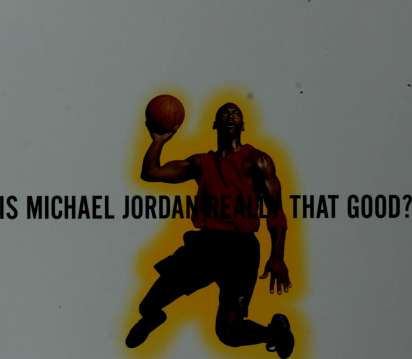
I looked at every game as an opportunity to show the world that, yes, it's true. I took the same approach in practice. If a new player came to the Bulls I wanted him to know I earned everything that came my way. Some nights I didn't get it done up to my expectations much less everyone else's. But I could accept that.
-

ly mind because I wasn't able to please the crowd. There were certain nights I was going to be a normal player. But over the course of a season I wanted to be consistent, particularly on m\ lor a consistent level of excellence. On the road I was able to draw energy from the hostile environment I knew the opposing team was more comfortable at home and difficulty presented a unique challenge I'm quite sure another player might have seen my situation and considered the expectations a burden But I looked forward to the challenge, thing went up another notch because the fans were even more hostile and the stakes were much higher. But I never considered the expectations or the demands stressful. Just the licity to the challenge from individual players in their comfortable surroundings It was right there in front of you I always could respond to that kind of challenge.
There were three players the Bulls were looking at before the 1990-91 season.
Walter Davis, Danny Ainge, and Dennis Hopson
were all available and the team had enough salary cap room to bring one of them in.
I wanted Walter Davis
because I knew he still could score and he'd be able to take some of that pressure off me.
I always loved Walter's game and I knew lie wouldn't be bothered by the Pistons' tactics.
But Walter's wife didn't want to move to Chicago. So Krause asked me about Ainge and Hopson.
I had a simple answer: Find out how each of them did against Detroit the last couple years and jet the guy who performed the best. But Krause had his mind made up before he even talked to me.
He wanted Hopson.
Now I knew Dennis Hopson wasn't the kind of guy we could count on against Detroit.
lid see fear in his eyes every time we played New Jersey, which is where Hopson had played.
Why not Ainge?
Damn wouldn't back down from the Pistons and he had played enough with Lam Bird and
the Celtics to understand what it took to win. But Krause thought Hopson could be a "franchise-type player
id that he just needed a new outlook because things hadn't gone well for him in New Jersey.
WELL, THEY DIDN'T EXACTLY GO GREAT IN CHICAGO, EITHER.
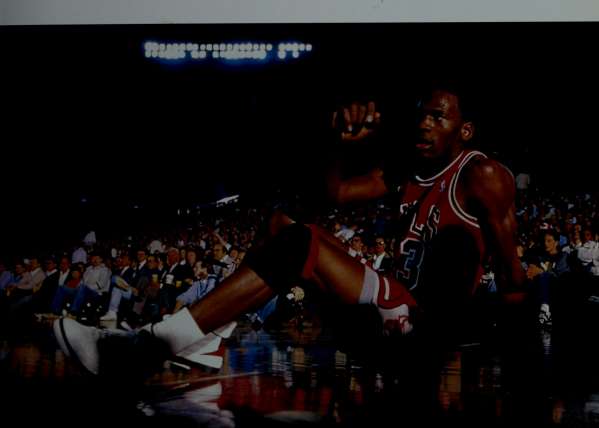
When we learned how to pla> through their tactics without losing locus, we became the good guys because- we played the game the wa) ii was supposed to be played.The) couldn't pull us down to their level and they certainl) couldn't intimidate US.When that happened, when we broke through and swept them lour straight m the 199 1 Eastern Conference Finals, the leaders of that team showed their true colors. The) acted like a bunch of spoiled brats who didn't gel their way. The) lost a lot of respect b) walking off die floor and not shaking our hands.
NO ONE REMEMBERS JOE DUMARS, JOHN SALLEY, AND VINNIE JOHNSON COMING OVER AND CONGRATULATING US AFTER THE GAME.
All anyone remembers is their leaders, IsiahThomas, Bill Laimbccr, and Mark Aguirre, walking right past our bench as the final seconds ticked off. The) weren't sportsmen.The) either didn't understand or didn't care about sportsmanship That's not how the game should be played.You have the obligation to demonstrate good sportsmanship.That's the American wa).
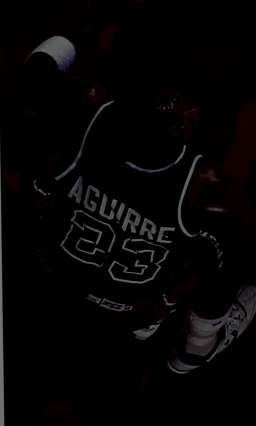
BY THE TIME WE WENT THROUGH THE PISTONS THE PUBLIC SAW HOW DETROIT PLAYED. I'M SURE THERE WERE DIE HARD DETROIT FANS WHO THOUGHT THE WAY THE PISTONS PLAYED WAS FINE, BUT EVERYONE ELSE HAD SEEN ENOUGH TO KNOW WHAT THEY WERE ABOUT. EVEN AFTER TWO CHAMPIONSHIPS,
FANS BEGAN TO SEE THEM AS BULLIES
TRYING TO DISTORT THE GAME WITH THAT BEAT-EM-UP AND KNOCK-EM-DOWN APPROACH.
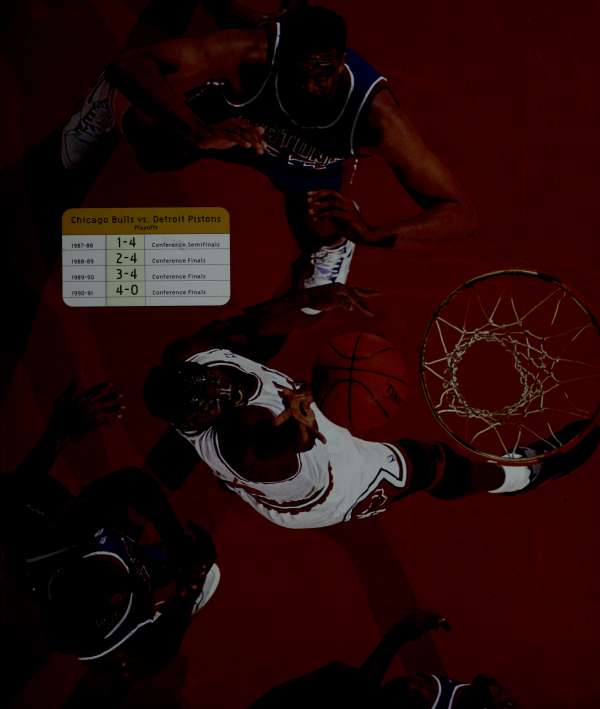
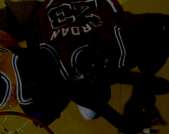


JORDAN
first
HAD WON SCORING TITLES AND MOST VALUABLE PLAYER AWARDS, BUT THE ONLY WAY I WAS GOING TO BREAK INTO THE MJ
0 WIN CHAMPIONSHIPS
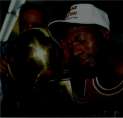
^^^here was no way I was going to get into their circle without winning a championship when at least one of them was still on top. Magic and Larry had been the kings of the 1980s in terms of championships. In 1991, the challenge was right therein front of me. Magic
was considered the consummate team player, the guy that made everyone around him better. I wasn't perceived as a player who made everyone better and I knew I wouldn't be until we won a title. Patrick Ewing, Charles Barkley, Karl Malone, and John Stockton? I didn't want
Magic to retire before we won a championship just like they didn't want me to retire before they could win one. They wanted to go through me just like I wanted to go through Magic. Beating Magic added credibility to that first title.
Barkley, Malone, Ewing, and Stockton, they don't want their championship to be tarnished by my absence. Look at Houston. The Rockets won back-to-back titles and they have to listen to people talk about whether or not they would have won anything if I had been playing. It's not
fair, but that's the way it is. And it was no different for me. That's why it was so important to go through Magic and the Lakers for our first championship. By going through the Lakers there was nothing anyone could say. If both of them had been gone by the time we started
winning championships I'm sure there would have been talk about how I hadn't been able to beat Magic and Larry in their prime. Maybe not after we won six championships, but at the time? Yes.
MAGIC'S AGENT CALLED DAVID FALK AND TOLD HIM TO CALL ME RIGHT AWAY. I WAS DRIVING HOME FROM PRACTICE WHEN DAVID CALLED, FRANTIC ABOUT HIS CONVERSATION. HE SAID MAGIC HAD SOMETHING VERY IMPORTANT TO TALK TO ME ABOUT AND I HAD TO CALL
HIM RIGHT AWAY. SO I DID. I GOT AHOLD OF MAGIC AND SAID, "WHAT'S UP?"
HE TOLD ME HE WAS HIV-POSITIVE
AND THAT HE WAS GOING TO ANNOUNCE HIS RETIREMENT IN A PRESS CONFERENCE ABOUT AN HOUR LATER. I WAS STUNNED.
I COULDN'T EVEN DRIVE. I PULLED OFF TO THE SIDE OF THE ROAD AND JUST LISTENED. I DIDN'T FULLY UNDERSTAND WHAT HE WAS SAYING AT FIRST.
I KNEW OF AIDS, BUT I WASN'T SURE WHAT HIV WAS EXACTLY. HE EXPLAINED THE SITUATION, WHAT IT MEANT, AND WHAT HE WAS GOING TO DO. I COULDN'T BELIEVE IT. EVERYTHING HE SAID WAS OPTIMISTIC. HE SAID HE WAS GOING TO BEAT IT AND THAT EVERYTHING WOULD BE FINE. IF THAT WOULD HAVE BEEN ME, I WOULDN'T HAVE BEEN ABLE TO TALK TO ANYONE.
I WOULDN'T HAVE WANTED TO TALK TO ANYONE. I CAN'T IMAGINE CALLING ME UP AND CALMLY EXPLAINING THE SITUATION AND REMAINING OPTIMISTIC.
I WOULDN'T HAVE BEEN ABLE TO SPEAK.
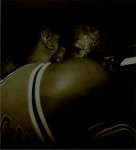
HOW MANY OTHER HIGH-PROFILE PEOPLE COULD HAVE STOOD UP,
FACED THE MUSIC, AND THEN GONE TO WORK ON THE PROBLEM?
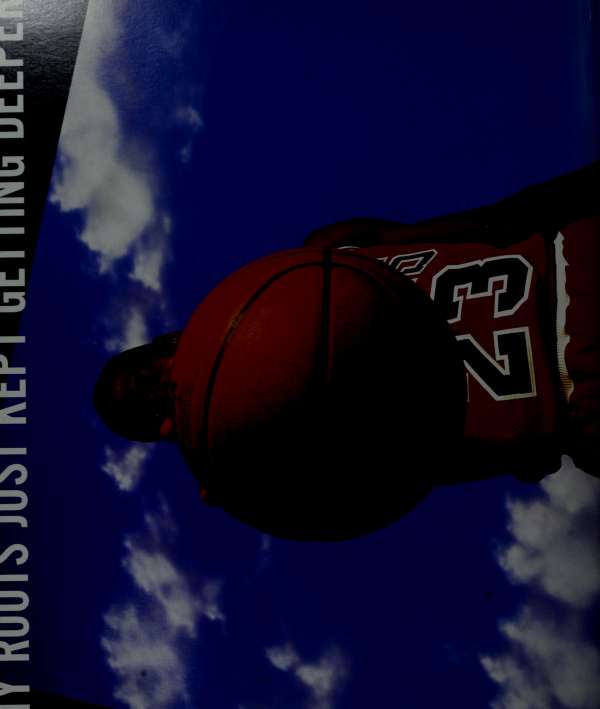
A 2
U r~ JJ w
-2 5
n o
>- —

I admit, I made some mistakes.

Qntil the 199 1-92 season there really hadn't at me personally. I admit, I made some mis- my actions. But the way I dealt with those situ-been much written or sa.d negatively about takes.They weren't huge mistakes, not the kind ations, particularly the gambling .sue. was me. After we won theirs, championship there that change your life. But I also stood up and human. I made a mistake and I faced the heat, was^nything anyo% could really say about faced the fire. The gambling stones were situa- To some degree I think people started seeing hlteh.ll ,nvmore so thev started looking tions I nut myself in and I was responsible for me as more like them, more of a person «ith
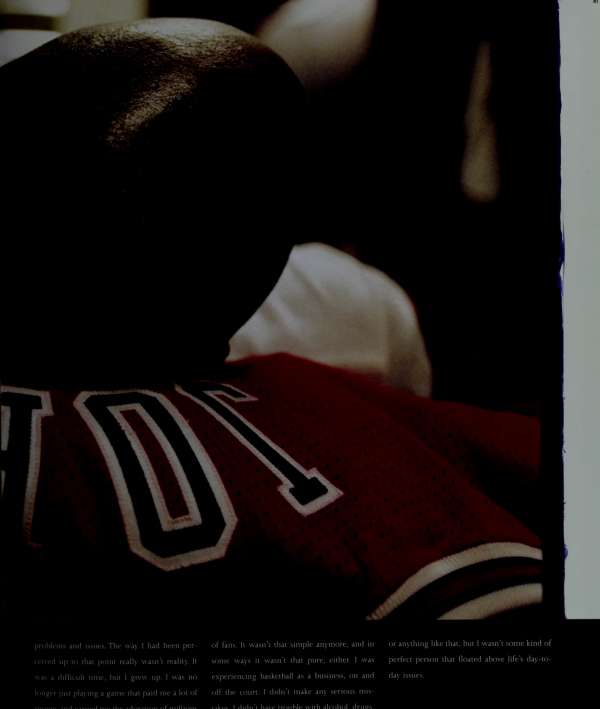
THE 1992 FINALS AGAINST PORTLAND WERE SUPPOSED TO DETERMINE
THE DIFFERENCE
BETWEEN CLYDE DREXLER AND MYSELF.
second
that point Clyde had been seen as a version of me, not necessarily a better version. So I'm sure that presented a challenge for him. But I took that discussion the same way. I wanted people to know there was a distinct difference, just as there was when I played against Magic, Charles, and other big-name players. I used the first championship against Magic to gain credibility. He was the guy on top at the time and I had to beat him to earn my place. By the time we played Portland I was the guy on top because we were the defending champions. Clyde wanted to use me the same way I used Magic. Later in my career, players wanted to go through the
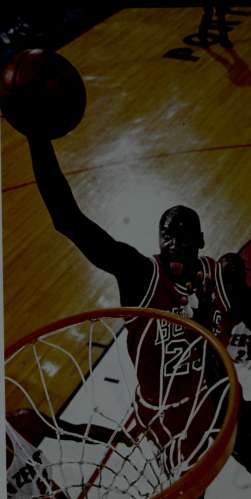
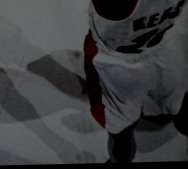
Chicago Bulls because it would legitimize the championship. I thought there was a difference, a real difference. It was similar to the 1998 All-Star game when Kobe Bryant was trying to make his mark against me. It's not something you announce but it's a challenge that simmers right below the surface. I was trying to break Clyde down by using all the facets of my game to say, "Don't even think about it." Besides, I had studied Clyde. I knew that if he hit his first three shots there wasn't a shot on die floor he wouldn't take. Interestingly, he was more dangerous if he missed the first three because he would focus on other aspects of the game. He would look to go to the basket and pick up a foul. He did have that great first step. I'm pretty sure he tried to push me to my left as well because that was my weaker hand. Portland played us tough but repeating was never about the physical difficulty involved in getting the job done. Winning two or three titles in a row was always more mental than physical. The only exception to that notion was 1998, which was a very physically draining year with all the injuries and the lack of understanding by some players about what it took to win three straight.
IF THERE IS ONE PLAYER I WOULD HAVE LIKED TO PLAY AGAINST IN HIS PRIME IT WOULD HAVE BEEN
Jerry West

He was a great clutch shooter, he could jump, he was tough, and he was quick. I would have liked to test myself against him at his best.
HOW WOULD I HAVE DONE?
We'll never know. From what I have read about Jerry and from what others have told me, he played the game a lot like I did. He was a great scorer, but he also played good defense. Could he have stopped me? I don't think so.
COULD I HAVE STOPPED HIM?
I don't know. But it would have been a great matchup.
HOW WOULD I HAVE DONE AGAINST ME?
h might sound strange, but I've often wondered how I would have done against myself. How would I have attacked at the offensive end? What would I have done defensively? There were some cracks, but I'm never going to tell anybody what they were. I think I could have done some things defensively, but 1 also know I would have come up with ways to counter those tactics offensively.The difference would have been mental. I wouldn't be able to out-think myself.The heart would be the same, the work ethic just as strong. I wouldn't have had an edge, at least not the edge I had against everyone else. Some nights it was being smarter, some nights stronger, and some nights just tougher. I could jump over certain guys, get by others, and later take most of them into the post. If I couldn't throw off their rhythm defensively, then I w ould attack them at the offensive end. I felt like I had a lot of weapons and not all of them were physical in nature. But against myself? I know myself too well. I can't say I would have won because that means I would have lost. It would have been fun to watch, though.

V
f
- v
v<
HE NEW YORK KNICKS TEAMS OF THE EARLY 1970S WERE VERY SIMILAR IN END. WE HAD BILL CARTWRIGHT, JOHN PAXSON, SCOTTIE, AND ME. THE FIRST TWO
MAKEUP TO OUR FIRST THREE CHAMPIONSHIP TEAMS. EVEN THE COACHES, RED CHAMPIONSHIP SEASONS WE WERE CONNECTED JUST LIKE THOSE KNICKS TEAMS.
HOLZMAN AND PHIL, WERE SIMILAR IN THE WAY THEY FOCUSED ON TEAM DEFENSE BILL WAS LIKE REED, PAXSON WAS SMART LIKE BRADLEY, PIPPEN DID A LITTLE OF
AND DEALT WITH PLAYERS. THE KNICKS HAD WILLIS REED, DAVE DEBUSSCHERE, EVERYTHING LIKE DEBUSSCHERE, AND I PLAYED BOTH ENDS LIKE FRAZIER. LIKE
BILL BRADLEY, AND WALT FRAZIER. BOTH TEAMS DISTRIBUTED THE BALL SELF- OUR BULLS TEAMS, THOSE KNICKS COULD HAVE WON IN ANY ERA. THE GAME MAY
LESSLY AND WORKED AS A UNIT TO MAKE THINGS HAPPEN AT THE DEFENSIVE CHANGE AND PLAYERS MAY BECOME MORE SKILLED, BUT THE KIND OF PLAYERS
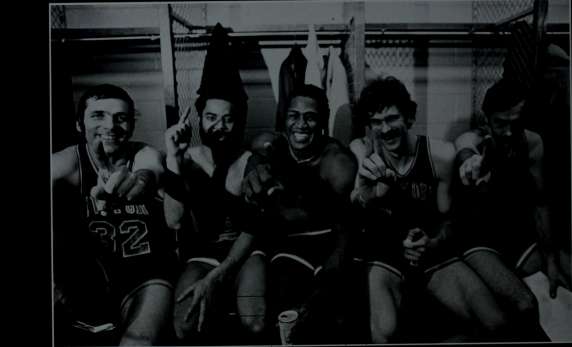
DAVE DEBUSSCHERE
WALT FRAZIER
WILLIS REED
PHIL JACKSON
RILL BRADLEY
WHO WIN CHAMPIONSHIPS NEVER CHANGE. GIVE ME GUYS WITH HEART, BRAINS, AND STRONG FUNDAMENTALS. NO MATTER WHAT HAPPENS IN THE GAME OF BASKETBALL, THOSE ELEMENTS WILL ALWAYS DETERMINE SUCCESS AND FAILURE. LOOK AROUND THE NBA. WERE THE BULLS ALWAYS THE MOST TALENTED TEAM? NEVER. OUR LAST THREE CHAMPIONSHIP TEAMS WERE HELD TOGETHER BY A COMMON BOND. WE KNEW HOW TO PLAY THE GAME AND WE KNEW HOW TO WIN.
INDIVIDUAL ABILITY PUT US IN POSITION, BUT EVERYTHING ELSE IS WHAT PUT US OVER THE TOP. JUST LIKE THOSE KNICKS TEAMS, WE HAD LEARNED HOW TO BREAK DOWN AN OPPONENT AND EXECUTE WHEN THE GAME WAS ON THE LINE. THAT'S HEART. AND THAT COMES FROM WITHIN. GIVE ME FOUR GUYS WITH GREAT HEART AND I'LL BEAT FIVE GUYS WITH GREAT POTENTIAL ANY TIME.
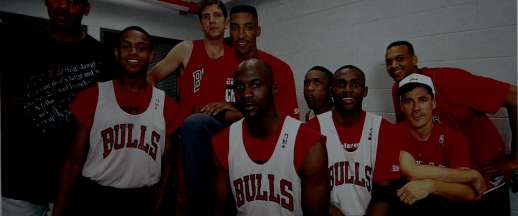

STACEY KING
B.J. ARMSTRONG WILL PERDUE SCOTTIE PlPPEN MICHAEL JORDAN BILL CARTWRIGHT HORACE GRANT JOHN PAXSON SCOTT WILLIAMS
ABOUT REEBOK'S PRESENCE ON THE USA BASKETBALL WARMUPS.

■
THAT WAS Tl WERE ALLOW!
IKETBALL PLAYERS FROI THE NBA WAS TRYING 1
CREATING THE DREAM
UNITED STATES DO IT RIGHT BY
■


I HAD WON A GOLD MEDAL IN THE 1984 GAMES,
SO MY FIRST THOUGHT WAS TO ALLOW SOMEONE ELSE TO HAVE THE OPPORTUNITY.
7
But the opportunity to spend time with Larry Bird, Magic Johnson, Charles Barkley, and some of the other guys appealed to me. We knew the games themselves wouldn't be that difficult. The only other issue involved my relationship with Nike and Reebok's sponsorship of USA Basketball. I knew I couldn't back out of the Olympics after I had agreed to go because that would have been un-American. I had committed to play for my country and I wasn't going to pull out over a logo, despite my loyalties.
Still, I didn't know how I would handle the medal ceremony. I wasn't about to stand up there in front of the world wearing a Reebok product. When it came time to receive the gold medal, we were told anyone who refused to wear the warmup wouldn't be allowed on the stand. Finally, about 20 minutes before the medal ceremony, I came up with an idea. Charles Barkley, Scottie Pippen, and I decided to go into the stands and collect American flags.
WHO COULD ARGUE WITH THE FLAG?
WE GOT ONLY FOUR OF THEM, BUT EACH OF US DRAPED ONE OVER THE LOGO.
might have been just as successful il Phil had heen more of a company man. but I don't think our chemistry would have been as good. We wouldn't have felt the same level of obligation. I'm not sure some of the other players would have gone that extra mile. Phil dealt with us every day and he understood what our objectives were as a unit. He understood, from one day to the next, what was happening with us individually and collectively. He was the only one who knew. No one else in the organization had that kind of insight. How could they?
Phil knew our strengths, he knew our weaknesses. Theoretically, if you had a dispute with the coach, a player or that player's agent could go to management and complain. But we had no dispute with Phil because we knew his primary objective was to put together the best team. We all had the same objective, and Phil knew more about the individual parts than anyone.
Guys like Jud Buechler relied upon Jerry Krause for a contract, so they had to stay in Jerry's good graces. But those guys also relied on me, Scottie, and Phil. I had a voice and I had options, so players kind of lived through me when it came to dealing with management. I never minced words with Jerry. I let him know exactly how I felt right to his face.
As players, we drew a line between the team and the rest of the organization. We knew Phil wanted exactly what we wanted. And we responded. I think our respect for Phil and the general lack . >t respect for Krause is what helped pull the Chicago Bulls apart. Krause lied about little things my children would lie about. And for what purpose? To show who's boss? We had one of the most successful teams in the history of team sports and this guy is running around playing games with his own troops? I never understood all that and I never will.
The relationship between Phil and Krause had been ruined before the 1997-98 season started. Phil told Jerry, "Stop feeling as though you've made all the right decisions. I'm just as much a reason for this team being successful as you are." That rubbed Krause the wrong way. He might have come from a different era, but I think Krause understood the depth of Phil's impact on the team. He knew why the players liked Phil and he knew why we busted our butts for Phil. But Krause wanted to be the reason we played hard. He wanted to be the guy the players respected and talked to. When Phil signed his last contract, Krause told him, "I don't care if you go 82-0. You're not coming back next season." That's why Phil knew it was over from the beginning of the season.
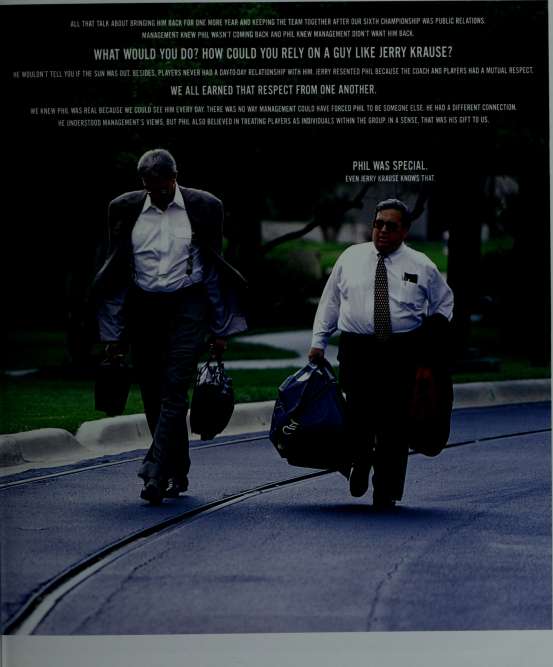
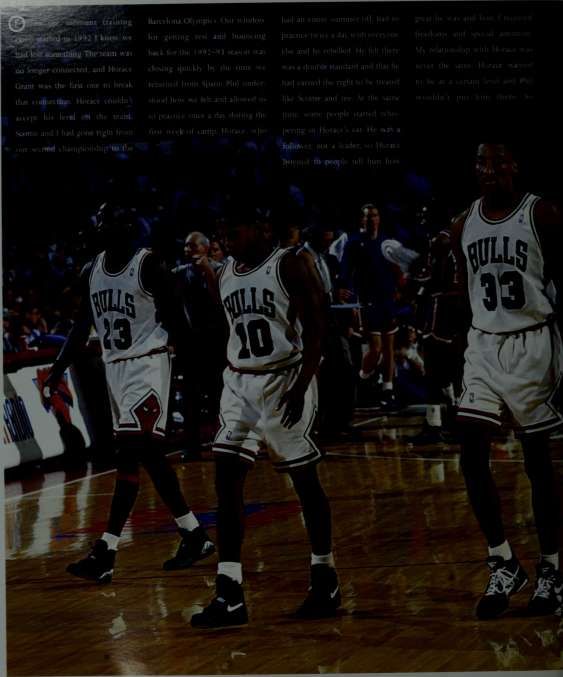
Horace got angr) and started atmosphere within the team see whispering to a iB>rter and
uvauny. a wedge within the team. became tense. We were not friends the next day there's a MtfA from
There were things leaked to the at that lime. On the court we did an anonymous sourcB^kiuw
media that I said in private or on our jobs, but awa> from the game exactly who was saying ^vnat ana
the uam bus. That's when the the harmony Phil had created was so did everyone else on the team.
disrupted.There were guys I could How can you play with someone
when you are afraid of saying
jrter and was part of the new era of player.
something to them in private? I felt I was past all that childish stuff and I didn't w ant to deal with
He wanted all his buddies to know he could average 20 points a night. But our system didn't allow a point guard to score like that. The system had been established and had been proven effective by the veterans. All we needed B.J. to do was step in and fill a role. We needed a point guard who got us

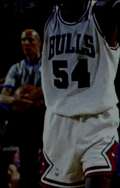
it anymore. Phil knew wjiat was into the system because the system going on, but he had, his own worked. For a while I was able Droblems with B.I. Armstrong. B.I. to deflect a lot of the friction
problems with B.J. Armstrong. B.J.
f V. p., -r .J)
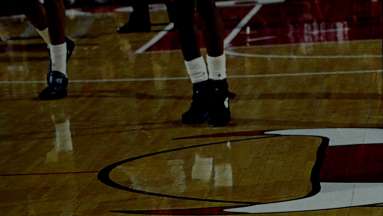
between Phil and B.J. because I could talk to B.J. and I liked him. But he would look at John Paxson and think, "I'm quicker, I can get down the lane faster." What B.J. didn't see was John's savvy. I'm pretty sure if you ask B.J. now he realizes the system was perfect for him, too.
3k
11 ffj I i V
WE ALL HAD TO SUPPRESS OUR
EGOS
FOR THE SYSTEM.
THERE WAS A GREATER GOOD, BUT SOME OF THOSE GUYS DIDN'T UNDERSTAND THE CONCEPT.
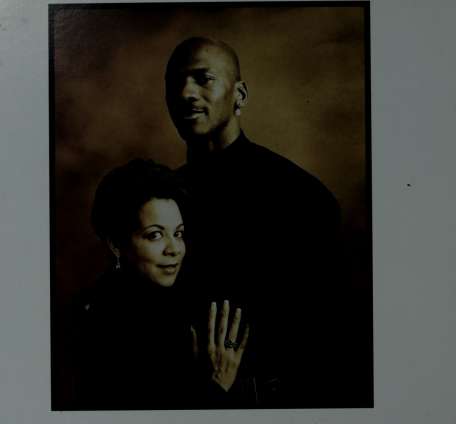
hiii in^ my mother's pregnancy witli me, my mother's mother died unexpectedly. The doctors made my mother stay in bed because they were worried about a miscarriage. According to my father, there was a near miscarriage and there was some question as to whether I would make it or not. I was born with a hose bleed and my parents were worried that there was something wrong with me.
Later on, when I was a baby, I fell behind my parents' bed and almost suffocated. Then, when I was about two years old I picked up two wires next to a car my father was working on. It had been raining and again, according to my father, the shock sent me flying about three feet. There were a lot of things that happened even as I got older that could have changed everything. I mean, my girlfriend got swept away in a flood and drowned when we were in college. Another time, I was swimming with a friend when both of us got pulled into the ocean by a strong undertow. I was able to get free and make it back to land. He never made it back.
HOW CAN YOU SAY THERE ISN'T A PLAN FOR ALL OF US?
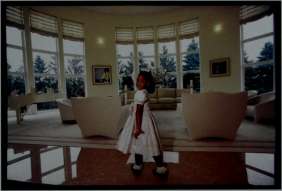

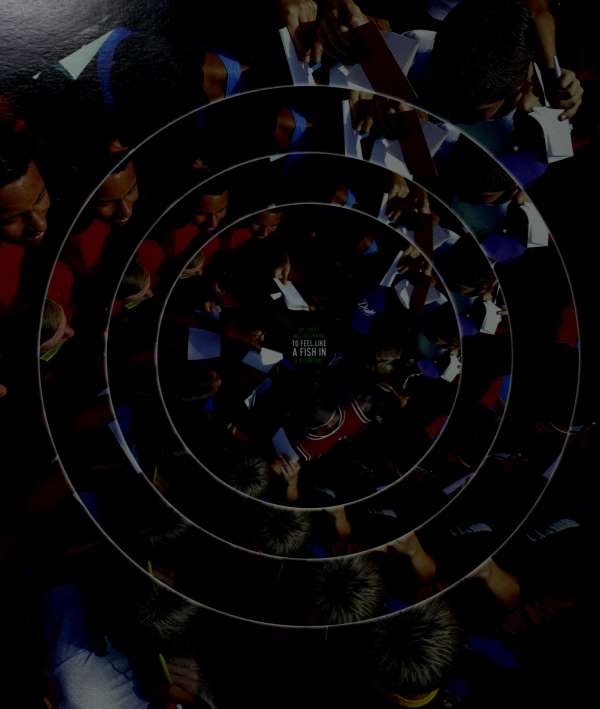
(M)y LIFE WAS CHANGING AND THE WAY I WAS PERCEIVED WAS CHANGING, TOO. I WAS A FATHER AND A HUSBAND AT HOME, BUT EVERYWHERE ELSE I WAS MICHAEL JORDAN. AND IT SEEMED LIKE EVERYONE HAD AN IDEA OF WHAT THAT MEANT EXCEPT ME. EARLY IN MY CAREER I REALLY COULDN'T GET A SENSE OF WHO I WAS FROM THE FAN'S PERSPECTIVE. I DIDN'T FEEL AS FAMOUS AS PEOPLE SAID I WAS. I WAS SO FOCUSED ON THE GAME THAT I DIDN'T HAVE TIME TO STEP BACK AND CONSIDER MY LIFE IN THE CONTEXT OF EVERYONE ELSE. TO SOME DEGREE, I THINK THAT'S WHY I WAS SO WELL RECEIVED. I WASN'T ACTING. I WASN'T TRYING TO BE SOMETHING I WASN'T. I ALWAYS FELT COMFORTABLE IN THE SPOTLIGHT BECAUSE I WAS JUST BEING MYSELF.
♦ WITH MY PERSONALITY AND HAVE BEEN IMPOSSIBLE TO BE NEVER WOULD HAVE ALLOWED ME OF ACT. I NEVER CONSIDERED ELSE, NOT EVEN ON THE BASKET-THE TOP AND I HAD A PRETTY
♦ BUT LIFE ON A PEDESTAL SUPPORTIVE FAMILY. WE WERE AND EVERYONE WAS SAFE. BUT I TAKE ON A DIFFERENT TONE. BASKETBALL ANYMORE, SO THEY
THE WAY I WAS RAISED, IT WOULD SOMETHING ELSE. MY PARENTS TO GET AWAY WITH SOME KIND MYSELF BETTER THAN ANYONE BALL COURT. I WANTED TO GET TO GOOD IDEA OF WHAT IT TOOK. CAN BE LONELY EVEN WITH A WINNING, I WAS PLAYING WELL, STARTED TO FEEL THE ATTENTION NO ONE WAS CRITICIZING MY
STARTED GOING AFTER ME PERSONALLY. I KNEW THAT TIME WOULD COME. IT ALWAYS DOES. IN A WAY, THAT'S THE BEAUTY OF AMERICA. WE HAVE THE FREEDOM TO BUILD PEOPLE UP AND TEAR THEM DOWN. EVERYONE CAN HAVE THEIR OWN OPINION AND I RESPECT THAT. ♦ BY THE BEGINNING OF THE 1992-93 SEASON, I WAS TIRED, PHYSICALLY AND MENTALLY. I HAD PLAYED FOR ALMOST TWO YEARS STRAIGHT, THERE HAD BEEN ONE MINOR CONTROVERSY AFTER ANOTHER, AND THE COHESIVE UNIT PHIL JACKSON HAD CREATED WAS STARTING TO COME APART. I COULD SEE THE EFFECT SUCCESS WAS HAVING ON CERTAIN PEOPLE. I KNEW THE NEXT 12 MONTHS WOULD BE DIFFICULT. BUT I HAD NO IDEA HOW HARD THEY WOULD BE AND JUST HOW MUCH MY LIFE WOULD CHANGE. ♦
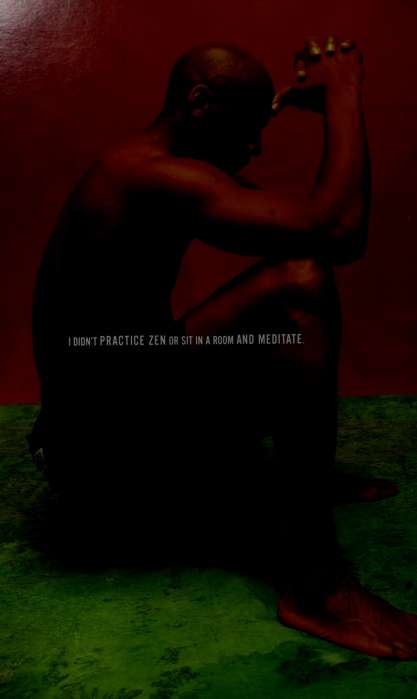
But Phil provided each of us with something we could incorporate into our lives. He didn't force-feed us, he just provided options. He presented the
thoughts intelligently. You could say there was some wisdom in his approach. He would appear to direct a thought or idea to the entire team, but usual!) the message was meant for an individual player. If you were that player, you got the message even though it was delivered to the entire group.That was one of Phil's gifts, his ability to talk to us individually within the collective. It's what tied us all together. I realized early on that some of the
practices
:es Phil spoke about I had been doing innately my entire life. For example, Phil brought in a sports psychologist to talk about getting into the
I had been there before so I understood the concept. I understood the rhythm of the moment and how the game starts flowing toward you.
I just couldn't comprehend how to get myself in the
designed to get us into the zone all the time. To
sally involves a level of perfection. I'm still not
a manner that allows a player to spend an entire 48 min-
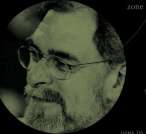
zone consistently. He provided methods and practices
achieve that level of awareness and understanding
sure we are meant to understand how to think in
utes in the zone. I relied upon game situations to find that
rhythm But all these concepts gave me something to think about, to challenge myself with mentally. Sometimes it was hard to find a challenge phys-ically, especially when I came back from baseball. But I have always been in tune with my body. When we first started meditating during stretching before practice. I thought it was crazy. I'm closing one eye and keeping the other eye open to see what other fool is doing this besides me. Eventually 1 became more accepting because I could see everyone making an effort. I opened my mind to meditation and Phil's teachings. My mind still travels a little bit, but Phil taught us to concentrate on breathing to bring the mind back to center. There are certain times when I incorporate those thoughts
into my daily life, but I certainly haven't mastered the concepts yet.
tor a playoff game in 199 3 . We had talked all season about me
leaving the game. Up 10 that point he never had seen me
an NBA game in person. After a long talk in April, he asked it
AS EARLY AS THE 1992 OLYMPICS
this was the end and 1 told him, "Yes. it is." I needed a change because I no longer had the motivation that had carried me to that point in m> career. I
I KNEW THE NEXT SEASON
would talk to Coach Smith every other week. I still do. We would talk about life, the family, what was happening with the team, how I was feeling men-
WOULD BE MY LAST. I HAD TALKED IT OVER
talk and ph> sically. As the season progressed I knew he could sense nay desire to leave. He never once tried to talk me out of it. He just wanted to under-
WITH MY FATHER AND HE KNEW I WAS
stand where I was mentally and how I had come to that decision. He said. "It has been a great run. you've accomplished a lot. and you have had a lot of
MENTALLY DRAINED. I NEEDED A BREAK AND
pressure. You probably do need a break." He always took that approach. He never tried to change a persons mind. Even w hen I was coming out of school.
I CONSIDERED LEAVING AFTER OUR
Dean never tried to talk me into staying despite the fact my leaving was going to have an impact on his program. He knew I was getting mentally ex-
SECOND CHAMPIONSHIP. THE ONLY REASON
hausted. We had won back-to-back titles, my time between seasons had been eliminated b\ the Olympics, and people were starting to pick awav at i
I CAME BACK WAS TO WIN
personally.There were also a lot of things happening with the team that told me it was time to make a change. Everyone enjoyed being on top ot the hill
A THIRD STRAIGHT CHAMPIONSHIP,
but they were starting to take shortcuts. It became such an unbelievable burden to constantly answer the critics, questions about Horaces contract, and all
WHICH WAS SOMETHING NEITHER
the sniping that was taking place between players. I didn't want any long good-byes and I certainly didn't want a season-long ceremony. Bv the time the
LARRY NOR MAGIC HAD DONE.
T
1993 playoffs started I had made up my mind. It was the perfect time. I knew it, my father knew it. and Dean knew it. \o one else had a clue.
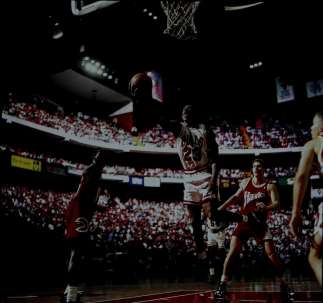

IF YOU PRACTICE THE WAY YOU PLAY, THERE SHOULDN'T BE ANY DIFFERENCE. THAT'S WHY I PRACTICED SO HARD.
I WANTED TO BE PREPARED FOR THE GAME.
I PRACTICED HARD ENOUGH THAT THE GAMES WERE OFTEN EASIER. THAT'S EXACTLY WHAT I WAS TRYING TO ACHIEVE. NO ONE CAN TURN IT ON WITHOUT PREPARING THEMSELVES IN PRACTICE. I HAD TO PRACTICE AS HARD AS I COULD SO ANYTHING WAS POSSIBLE ONCE THE GAME STARTED. I LOVED THE COMPETITION OF PRACTICE. I GOT THAT FROM NORTH CAROLINA, WHERE COACH SMITH WOULD MAKE EVERY DRILL COMPETITIVE. THAT GROWS ON YOU, SO EVERYTHING WE DID IN PRACTICE BECAME COMPETITIVE, I TOOK PRIDE IN THE WAY I PRACTICED.
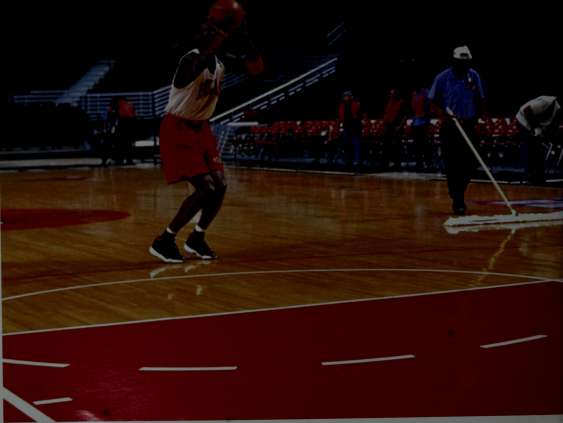
A'
> r -
T he fourth quarter of a basketball game changes the dynamics of the game for players. My focus would become clearer while other players lost their focus as the pressure mounted. A lot of times I was able to dominate in the fourth quarter because as I channeled myself into the game, my opponent was doing just the opposite, which doubled the impact of my attack. As the momentum starts to turn, the first thought for most players is a negative one. I never went into the fourth quarter of a game thinking we couldn't win. If I ever let a negative thought slip in, then I might as well have sat down. As long as I felt we could win, then believe me, brother, we are going to have an opportunity to win. Going into Game 6 of the 1998 Finals against Utah we went into the fourth quarter down three points. That was nothing. And it was nothing even with one of our key players out. My whole thought process was always, "We're going to win this game. I don't know how, but I believe we are going to win." It didn't matter whether we were down 4 points or 24 points. I always felt things would work out. During the 1997-98 season I built toward the fourth quarter because I was conserving energy early in the game. My game had always been to go all out for 48 minutes. Now I was conserving myself for the last 12 minutes.
third
PLAYING PHOENIX
AND CHARLES BARKLEY IN THE 1993 FINALS
WAS LIKE PLAYING AGAINST YOUR LITTLE BROTHER
AND KNOWING YOU'RE WELL-EQUIPPED. '

YOUR LITTLE BROTHER MIGHT BEAT YOU ONE OR TWO OUT OF SEVEN, BUT YOU KNOW HE'S GOING TO GET BEAT IN THE END.
THE SUNS DIDN'T KNOW HOW TO WIN.
THEY KNEW HOW TO COMPETE, BUT THEY DIDN'T KNOW HOW TO WIN. THERE IS A DIFFERENCE.
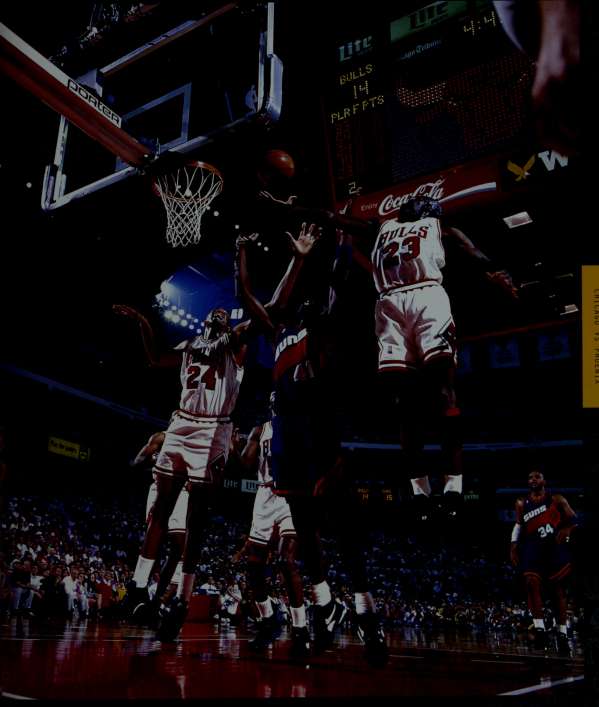

MY FATHER'S DEATH ENDED ONE OF THE MOST SUCCESSFUL AND DIFFICULT PERIODS OF MY LIFE
HE WAS MY BEST FRIEND AND HE KNEW EVERYTHING ABOUT ME.
HE KNEW THINGS THAT WERE GOING TO HAPPEN TO ME LONG BEFORE THEY HAPPENED. THE LIGHT SIDE OF MY PERSONALITY COMES FROM MY FATHER HE WAS A PEOPLE PERSON AND HE HAD A GREAT SENSE OF HUMOR. HE TAUGHT ME A LOT ABOUT LIFE. AND ONE OF THOSE LESSONS WAS THAT EVERYTHING HAPPENS FOR A REASON.
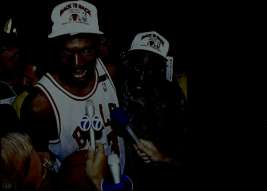
Qhats why I was able to remain positive about life, my life, after my fathers death. I look at that experience as Gods way of telling me it was time to stand up and make decisions by myself. I no longer had the support and guidance of my father to fall back on. It was my time to become more .nature in my approach to life. Everything I had done to that point, from basketball to business, I passed by my parents. I valued their opinion and to some extent I felt I needed their guidance. When he died I realized I had to start making those decisions independent of everyone else. I could still ask for advice and I would listen, but the responsibility was mine alone. I had to make the kind of decisions men make and I had to make them for myself without that shoulder tojfex^n. That doesn't mean he's not here with me at every moment. I can feel him. I know he's with me. I have all the life lessons and teachings he jfcged me in the 30 years I was around him. And I have his voice, his presence.
T
fuxU^M^ a+ui 6uu^ llje, uutL (^lo^aXcc Sum. ^uUo^. tJ? laJk iuxxJk- aX~ ZhaX~ oa^L Ll^

I

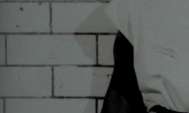
NOjSMQ KjN
f il
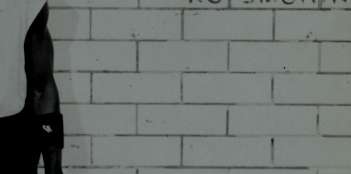
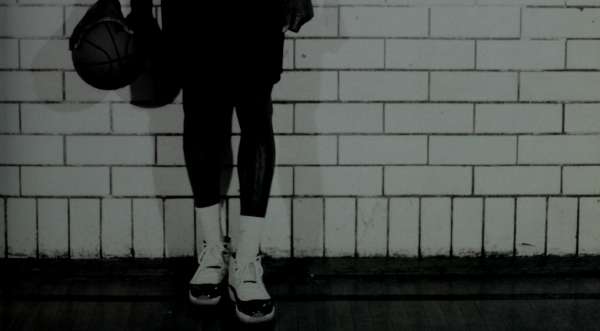
.• ..•
TH^ftA^^ AND DAVID FALK TALKED ME INTO TAKING THE SUMMER
IT WHAT II WANTED 18^ flt*TJlKNEW,M¥ FATHER'SDEATHANQ EVERYTHING THAT FOLLOWED, THE ATTACKS ON ME AND MY FAMILY, THE SUGGESTION THAT I WAS SOMEHOW TO BLAME OR THAT MY GAMBLING PLAYED A ROLE, ONLY HELPED TO CONFIRM WHAT I KNEW MONTHS BEFORE. I NEEDED A BREAK IN EARLY SEPTEMBER I MET WITH PHIL IN HIS OFFICE AT THE BERTO CENTER. I HAD BEEN IN THERE MANY TIMES BEFORE AND I KNEW I WOULDN'T BE IN THERE TOO MANY MORE TIMES IN THE FUTURE. I DIDN'T TAKE A LOT OF TIME.


I JUST ASKED HIM TO GIVE ME A REASON TO KEEP PLAYING.
Phil looked at me for a second or two and then talked about hou 1 had a God-given gift and that I had a responsibilil) to use that g.f. for the benefit of others. I said I understood and that I agreed with Ins reasoning. But at some point in tune I was going to retire anyway What difference did it make if that time was now or two years from now' My gift would be taken away sooner or later, whether 1 liked i. or no, Age and the simple passage of time would see to that. Phil looked at me and tried to make another point or two, but at that moment I kneu wha, I was going to do. He just couldn't come up with a good enough reason for me to continue playing. And I didn't have one. either.
MICHAEL JORDAN
CHICAGO BULLS 1984- 1993
ic best there ever was I he best there ever will be

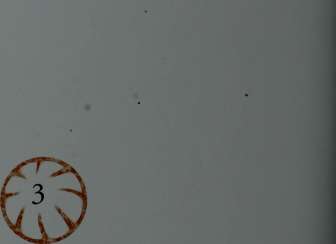
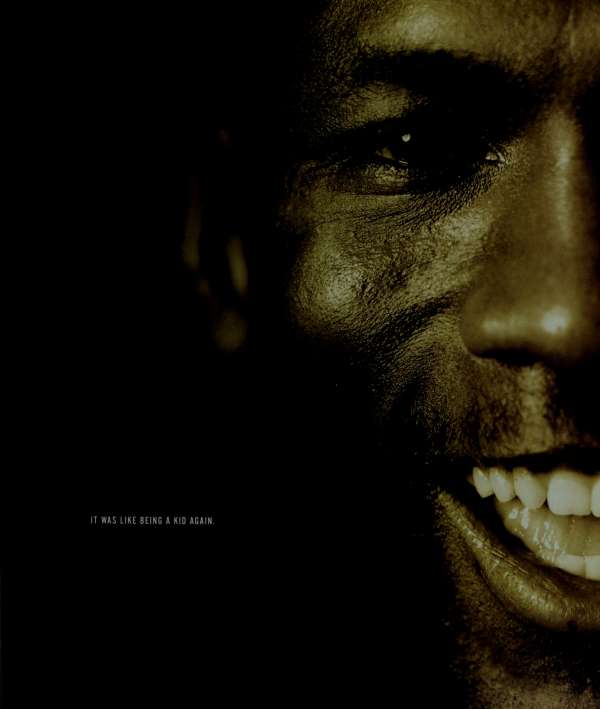
I WAS THINKING
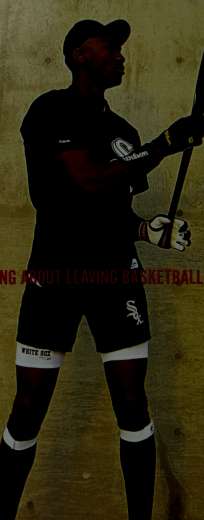
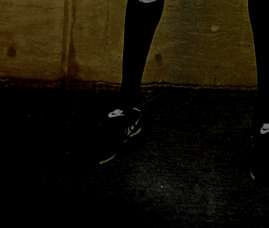
Mjy father and I talked about baseball all the time because of what Bo Jackson and Deion Sanders were doing. He always had an idea about me playing baseball because he had started me^in the game when I was growing up. I started getting invitations to play a game or two for minor league teams in the early 1990s. Muggsy Bogues and Del Curry had played a little bit with a team in North Carolina, so my 'father said, "Why don't you give it a try?" But I never had^nough time in the offseason, and besides, I hadn't accomplished everything I wanted to accomplish in basketball. But I knew . I'd give it a shot at some point. No one even knew we were having these conversations much less diat I was serious about stepping away from the game of basketball. By the summer of 1992 I was ready to commit the entire summer to baseball. The Dream Team and the
FOR BASEBALL AS, FAR BACK AS 1991.
1992 Barcelona Olympics put my baseball plans on hold. Still, I didn't know for sure I was going to play baseball when I retired. I didn't know whether I'd have the opportunity to play. I went to Jerry Reinsdorf and told him it was something I wanted to pursue. He knew of my interest in the game, so he wasn't caught completely off guard. Neither one of us wanted to . . .v,«:- • mate, a spectacle of my desire to play, so I started workmg out privately with Bill Melton, a well-known former White Sox player, and the team's trainer, Herm Schneider. After about eight weeks the news started to leak out and I told the \vbrld. I always, considered myself a great all-around athlete and I believed I could do anything ifl set my mind to it I was serious ^^jJr^about making the White Sox team, i •i^T
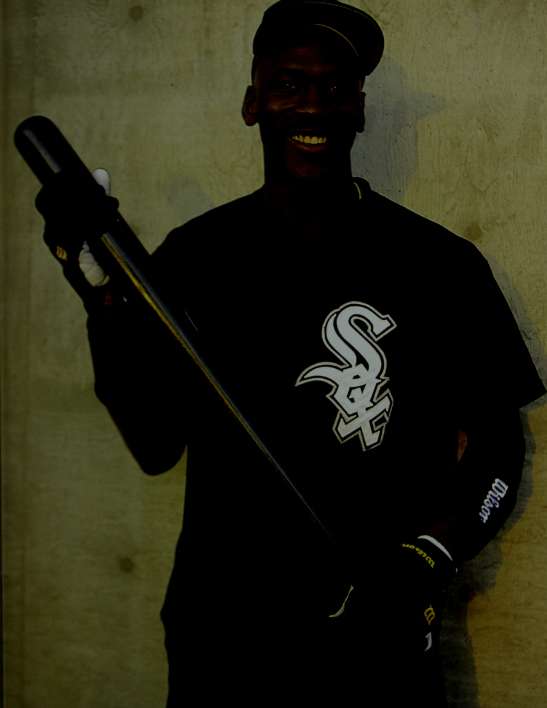
YTHlNGI HAD DONE TO IMPROVE l\

KRNIAK, THE WHITE SOX HITTING COACH. I'D HIT WITH WALT FOR AN HOUR OR TWO, THEN CO THROUCH [HE I
IF ANYONE DIDN'T THINK I WAS SERIOU THE BLOOD DRIPPING OFF MY HANDS
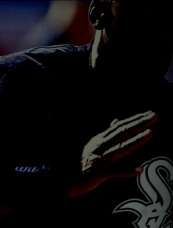
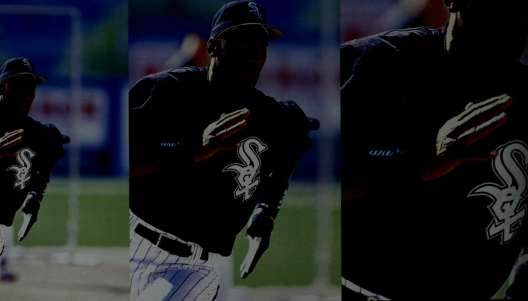
:RE IS SO MUCH GOING ON IN THE COURSE OF A BASEB . . THRdPWN AT ME. I PUT PRE!
ISEBALL. I HAD TO BUILD MYSELF UP FROM MY FINGERTIPS TO MY SHOULDERS.

WE GOT DOWN TO FLORIDA AND SPRING TRAINING, I WOULD BE THERE AT 6 O'CLOCK EVERY MORNING TO WORK WITH WALT ACTICE AND FINISH THE DAY BACK WITH WALT. THAT WAS MY ROUTINE EVERY DAY OF SPRING TRAINING IN 1994.
r WAS BECAUSE THEY COULD NOT SEE IR THOSE 6 A.M. BATTING SESSIONS.
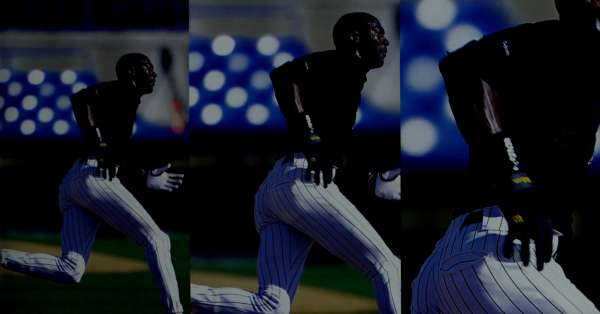
A SLIDER. A CURVEBALL AND FASTBALL. TWO-SEAMERS AND FOUR-SEAMERS, GETTING LEADS, READING A PITCHER FROM FIRST BASE. SLIDING. EVERYTHING WAS JLD HAPPEN. NOT JERRY REINSDORF. NOT WHITE SOX GENERAL MANAGER RON SCHUELER, NO ONE KNEW WHETHER I WOULD SUCCEED.

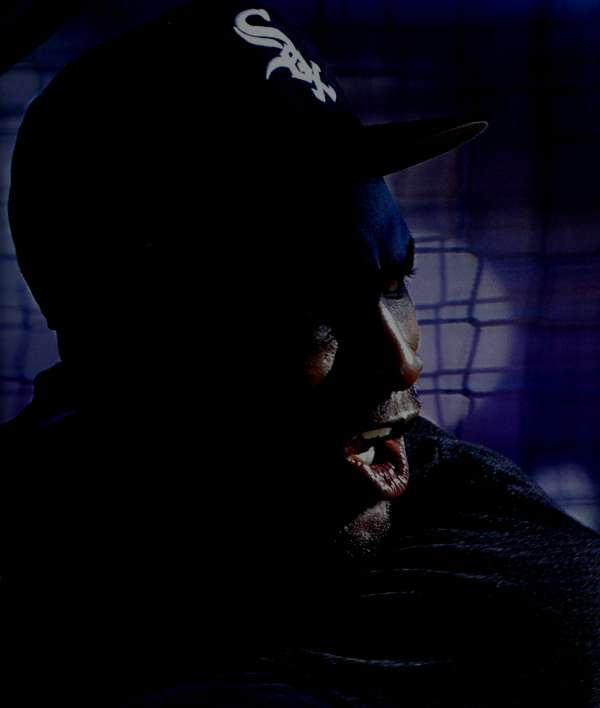
ffli
KV DIDN'T PAY MUCH ATTENTION TO BASKETBALL
I HIT .202 AT BIRMINGHAM
WHEN THE BASEBALL STRIKE STARTED I FELT LIKE I HAD BEEN PUT IN A BOX.
THEY WERE COMING TO ME FOR ADVICE

HE SAME SITI ING THE 0
I DECIDED TO WALK AWAY

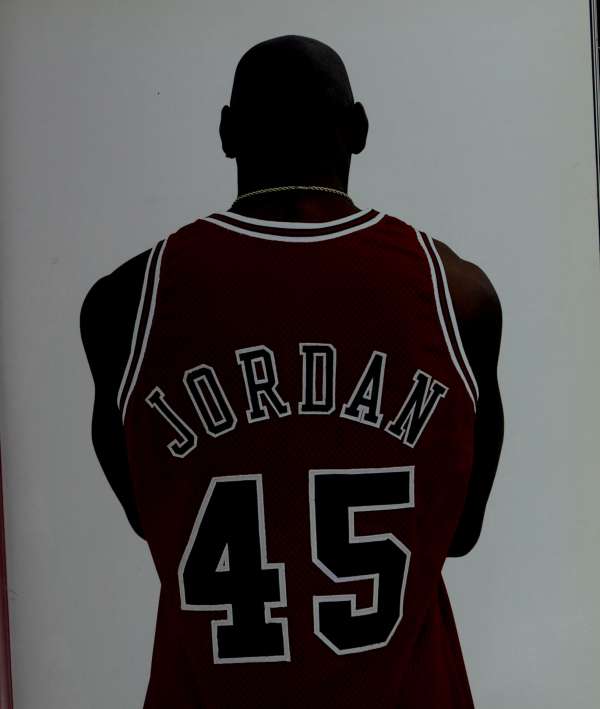
45-2=22.5
WHEN I CAME BACK I DIDN'T WANT TO PLAY WITH THE LAST NUMBER MY FATHER HAB SEEN ME WEAR.
BECAUSE HE WASN'T AROUND,
I THOUGHT OF MY RETURN AS A NEW BEGINNING.
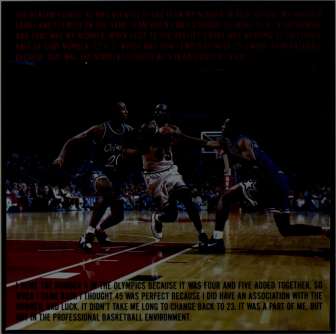
4 +5 9
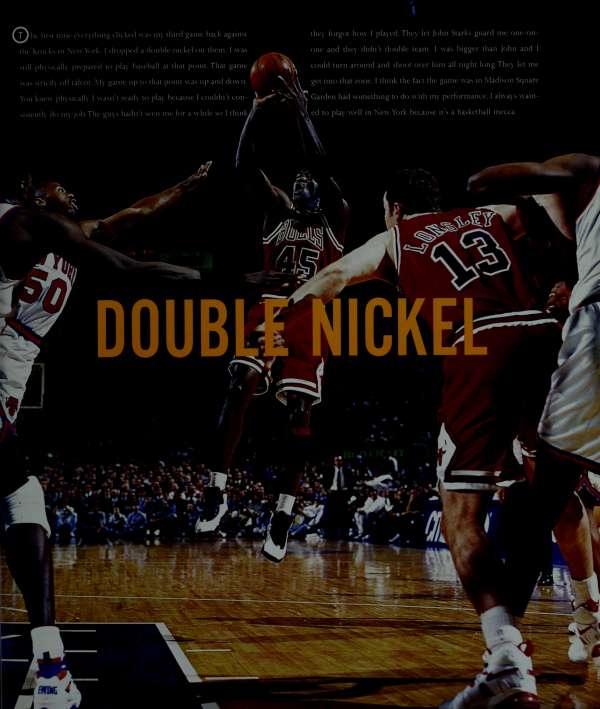
WE GOT KNOCKED OUT OF THE 1995 PLAYOFFS BY ORLANDO AND I KNEW I HAD A LOT OF WORK TO DO. I TOLD DAVID FALK
THERE WAS NO WAY I WOULD DO THE MOVIE SPACE JAM" UNLESS I WAS ABLE TO WORK OUT
AND PLAY ON THE WARNER BROS. LOT:
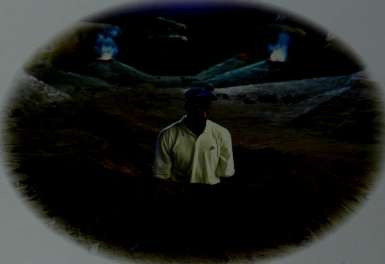
«

here was no way I could stay out there for eight weeks after getting
knocked out of the playoffs and being criticized for coming back. I said,
"David, I need the work. I have got to practice. I need to play." He says, "What if we can create a working environment for you on the set that allows you to still do the movie?" I said, "Show me." So they built this state-of-the-art gymnasium that covered an entire parking lot. It had air-conditioning, stereo system, card tables, seats, lights, every conceivable weight-lifting machine, everything I needed. I would go over to the gym at lunch to lift weights and then return from about 7:00 to 9:30 every night to play. There was never a camera in the place. Reggie Miller and Chris Mills were there every single day. Charles Oakley came out and
played. Magic came out the last day, Tim Hardaway, Dennis Rodman, all the UCLA players, Tracy Murray was there every day, Lamond Murray, ReggieTheus, Jawann Howard, Larry Johnson, Rod Strickland, Grant Hill, all kinds of guys came into town. The games were great. Oakley took over the middle and played just like he did during the season. Reggie and Eddie Jones went at it pretty good. I knew why these guys showed up. They wanted to learn and to try to get a feel for the way I played. I knew their strategy. But they didn't know I was doing the same. I always felt like I could learn faster than other people. So they were helping me just like I was helping them. I could feel it coming back pretty quickly.


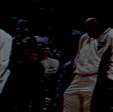
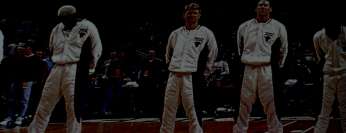

SUMMER.
A Kffl COMING OUT OF COLLEGE WITH SOMETHING TO I'lllM III! HlHHN'illli ill'i I lift 11 11)111 HI I I III BUT THERE WAS NO STOPPING US ISON. WE GOT OFF TO A GREAT START. WE WON 18 IN A ROW AT ONE POINT AND WERE ROLLING. W
WE WERE DOMINATING. THEY KNEW WHAT WE WERE RUNNING, BUT WE JUST PICKED OPPOSING TEAMS APART. EVERYBODY ON THAI TEAM
WAS DEDICATED TO PLAYING THEIR ROLE BECAUSE MOST OF THEM HAD SOMETHING TO PROVEJIOTEV^ MIL IIAB W fm TOAMPlONSHlP. DENNIS RODMAN HAD WON IN DETROIT, BUT HE HAD TO PROVF HF COULD B | ^TTIIIIir OTIirn TmnnHTiiTiYr INFLUENCE. OUR APPROACH THAT SEASON W A3 R I GHT I N I UNE WIIH MUIIIIUDL, WHICH WAS IU WIN AND BE DOMINANT IN THE PROCESS. 72 AND 10? IN THIS ERA WITH 29 TEAMS? INCREDIBLE. THAT WAS THE BEST RHYTHM ANY BULLS TEAM I PLAYED FOR HAD FOR AN ENTIRE SEASON.
THERE'S NOTHING EASY ABOU1
J^know some players think they could do what I did if they had the kind of freedom I had. But they don't even have a basic understanding of w hat it takes to be that consistent over the course of an 82-game season. Before the 1997-98 season, Penny Hardavvay told me he was going to win the scoring
title and average 40 points a game. Shaquille O'Neal was gone and Hardaway figured he would have all the opportunities. He was serious, too. Do you know how hard it is to average 40 points? That's 10 points a quarter, every quarter of every game. And that's just your average. Now, if you don't score at
least 10, then you have to score even more later.
You have to do that while the defense is completely focused on stopping you from scoring. That means you have to fight off double teams, get to the line, and knock down at least 80 percent of your free throws. All those things have
to happen every single night. Scoring like I do doesn't happen because a situation changes or a player decides to be more aggressive. You have to study the game, find opportunities. The opportunities you find one night might not be there the next. You have to figure out ways to beat virtually every one
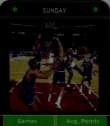
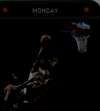

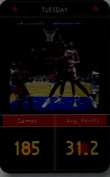
r
WEDNESDAY
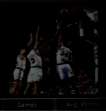
1Z0 32.Z
LEADING THE NBA IN SCORING.
of your opponents because you can be darn sure that if you're scoring that many points every one of your opponents is going to make a point of shutting you down. You have to be aggressive at all times mentally, then pick and choose when to attack physically. These kids don't understand that. They don't have
any understanding of the mental aspect necessary to score 40 points even one night.
You have to be able to adjust constantly. Do you come out at the beginning attacking to distort the entire game to your advantage? Do you try to get everyone else involved so they become a threat
and open the floor for you? I haven't even talked about what you have to do at the defensive end to get easy baskets. Steals, blocked shots, break-aways, all those situations play into a 32-point night. At this stage of their careers, guys such as Hardaway and Grant Hill are getting points strictly off phys-
ical talent. Now let's move to the playoffs, where you're playing the same team as many as seven times. The adjustments have to come quicker, sometimes between plays. And you have to do all these things with the objective of winning the game. I don't think any of them are ready for that.
SATURDAY •
Games
Avg. Points J

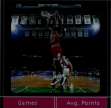
930 31.5

THE CHICAGO BULLS WERE THE PERFECT TEAM FOR DENNIS RODMAN, AND PHIL JACKSON WAS THE PERFECT COACH. PHIL ALLOWED DENNIS TO DO WHAT HE WANTED, BUT DENNIS KNEW HE HAD TO LOCK IN AND CONNECT
^ach of us had the freedom to be individuals and to exhibit our own unique personalities. Phil gave us that. He understood that putting restraints on players also took away some of the avenues players used to relax. Ultimately, that isn't good for the collective. Dennis was probably one of the reasons the wedge between Phil and management went so deep. Management gets nervous when players have the kind of freedom Dennis had. Krause never trusted players enough to provide that kind of space. Management was most comfortable with everyone on an even level with a single set of rules. Phil understood some players deserved more advantages than others. Dennis could go to Atlantic City and gamble all night and then plug in and get 25 rebounds. So he earned the freedom Phil granted him. Where did Phil come up with that philosophy? I have no idea. But I do know it was accepted and
'A
WITH THE REST OF THE TEAM AT GAME TIME. I DIDN'T CARE IF HE RAN OFF ON HIS SIDE TRIPS, OR STAYED OUT ALL NIGHT DOING WHATEVER IT WAS HE DID. BUT WHEN WE ALL ARRIVED AT THE ARENA WE ALL HAD TO PLUG INTO ONE ANOTHER.
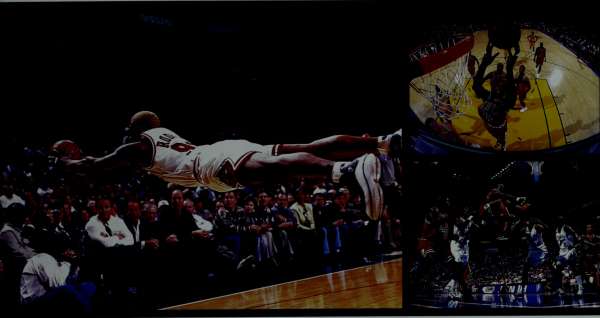
respected by every player. If you showed him you could go your own way and still plug back into the team at game time, then he would allow you space. At the same time, if Phil ever felt those freedoms jeopardized our approach, he never had a problem pulling back the reins on anybody, including me, to bring the collective thought process back together. He was a player, he had been on championship teams, he had been in an environment with intelligent teammates who were independent and able to make choices. That's why Dennis found a home with the Bulls. That doesn't mean there weren't some harsh words from time to time. There were, usually from me. But our atmosphere allowed Dennis the freedom to be himself within the context of a professional basketball team trying to win championships. In that respect, the Chicago Bulls were unique.
IT SEEMED LIKE EVERYTHING HAD FALLEN INTO PLACE FOR GAME 6 OF THE 1996 FINALS AGAINST SEATTLE. I HAD COME BACK WITHOUT MY FATHER, EVERYBODY WAS QUESTIONING WHAT I HAD DONE UP TO THAT POINT AND WHAT MORE GRATIFICATION COULD I POSSIBLY GET OTHER THAN
WINNING THE CHAMPIONSHIP
ON FATHER'S DAY AS
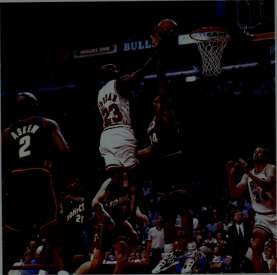
f
fourth
/
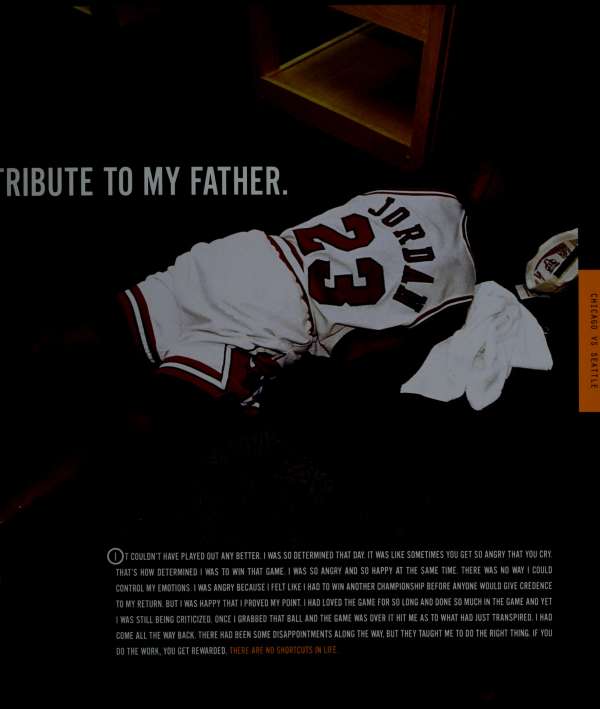
(T)T COULDN'T HAVE PLAYED OUT ANY BETTER. I WAS SO DETERMINED THAT DAY. IT WAS LIKE SOMETIMES YOU GET SO ANGRY THAT YOU CRY. THAT'S HOW DETERMINED I WAS TO WIN THAT GAME. I WAS SO ANGRY AND SO HAPPY AT THE SAME TIME. THERE WAS NO WAY I COULD CONTROL MY EMOTIONS. I WAS ANGRY BECAUSE I FELT LIKE I HAD TO WIN ANOTHER CHAMPIONSHIP BEFORE ANYONE WOULD GIVE CREDENCE TO MY RETURN. BUT I WAS HAPPY THAT I PROVED MY POINT. I HAD LOVED THE GAME FOR SO LONG AND DONE SO MUCH IN THE GAME AND YET I WAS STILL BEING CRITICIZED. ONCE I GRABBED THAT BALL AND THE GAME WAS OVER IT HIT ME AS TO WHAT HAD JUST TRANSPIRED. I HAD COME ALL THE WAY BACK. THERE HAD BEEN SOME DISAPPOINTMENTS ALONG THE WAY, BUT THEY TAUGHT ME TO DO THE RIGHT THING. IF YOU DO THE WORK, YOU GET REWARDED. THERE ARE NO SHORTCUTS IN LIFE.
MITCH RICHMOND OTIS BIRDSONG ALVIN ROBERTSON JOE DUMARS REGGIE
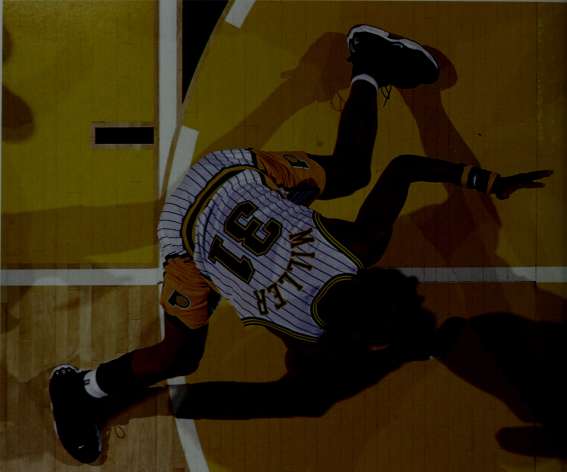
^^efT Malone was one of the toughest guys I played against during my career. I could play solid defense against him and he still could make bijj baskets. Mitch Richmond was definitely difficult for rat But Malone had a unique style. He had a great fallaway jump shot.^verything he did was 1 fallaway. I could play solid defense and he still could afl&iat shot off. He was tough and he put up some solid numbers against me. Mitch plays weft" without the ball, he's savvy at the offensive end and he's strong. We had similar styles in that sense. From day one I liked Mitch. Just like from day one
I liked Ray Allen because he has a lot of skills. Early in my career guys like World B Free and George Gervin gave me problems. I was young and I had never seen such smooth play. I had some good battles with Otis Birdsong and Micheal Ray Richardson. Alvin Robertson was tough. He always gambled
defense too much, though. He was real tough. He was ajjands-on, scrappy-type player. Physically he'd bang you. Joe Dumars was tough but he
ER WORLD B FREE GEORGE GERVIN RAY ALLEN MICHEAL RAY RICHARDSON
always gol help. He was very, ver) smart. Reggie Miller is tough because he knows how to get you into foul trouble and he's not afraid to take a shot from an) distance.That's the thing about Reggie. Defensively, I didn't have a problem with Reggie. When I wanted to take advantage of Reggie physically 1 could do that offensively. He moves w ithout the ball very well and he shoots quickly. He presented some problems, but once I got a feel for him 1 knew how to tone him to his weakness. : f/ ; ;y&l
4
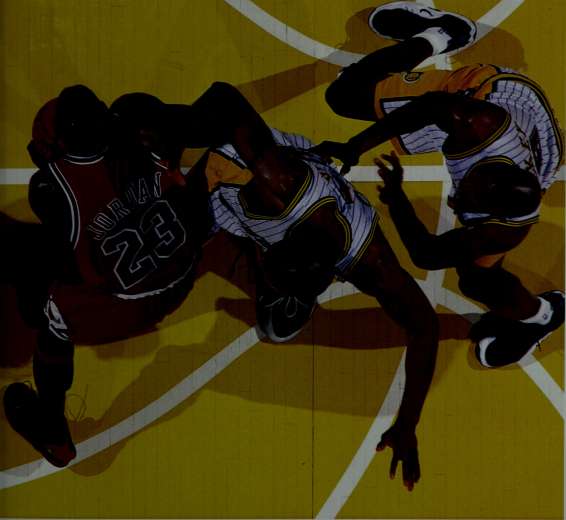

ON DEFENSE. SCOTTIE COMMITTED TO IT Fl THAT TOLD ME HE WAS SPECIAL
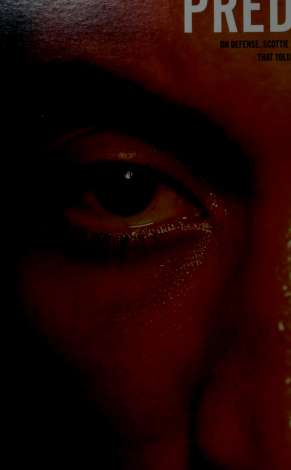
PREDATORS
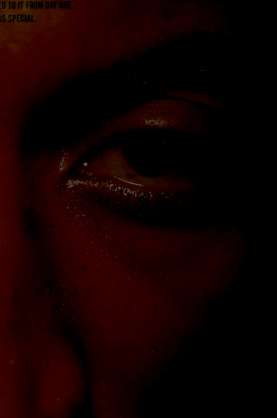

VERY FEW GUYS COME INTO THE NBA WITH THE IDEA OF DOING ALL THE THANKLESS TASKS NECESSARY FOR A TEAM TO WIN. THEY USUALLY ARE FOCUSED ON SCORING POINTS
AND PLAYING ENOUGH MINUTES TO PAD THEIR STATS.
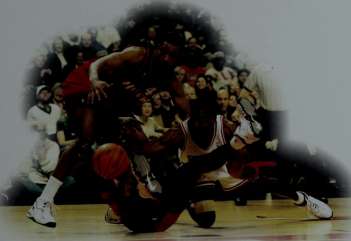
^Jrom my perspective there are very, very few I came across in my career that I would consider to have achieved greatness. I would say Magic Johnson and Larry Bird achieved greatness to a certain extent. I learned from their example and took it a step further by becoming a factor at both ends of the court. The one player who I think is close to them is Scottie Pippen. He's an intelligent player, he understands the game. He had to learn how to be a warrior, how to be aggressive at all times, but Scottie did that. I've seen all facets of this game. It's not just what he can do offensively, but it's what Scottie Pippen can do defensively. He's right there with those guys except as a leader. Scottie has leadership qualities, but I didn't know if he wanted that role. In his defense, Scottie came from a smaller environment. It's like a kid growing up in the country playing against kids
who grew up in the city. The kid in the country can learn, but it might take him a little longer. Bird and Magic came into the league ready to teach in some respects. Scottie came into the league ready to learn. Believe me, I don't think he's far from those guys. There were a lot of times on the court I felt like I was playing with my twin. That's how much he has grown in the time we played together. I still think I could break him down offensively and I have mastered some of the nuances of the game to a greater degree. But it's still a good match. He learned how to be a predator which meant attacking all the time, but still being able to surprise people. You never sit back and let yourself be attacked. The difference between us was Scottie was an attacker as long as he knew he had a pack of wolves with him. I'm an attacker without a pack of wolves. That's a big difference.
SEE THE FEAR IN (THE EYES
Y WHEN THEY SAID SOMETHING THEY WERE!



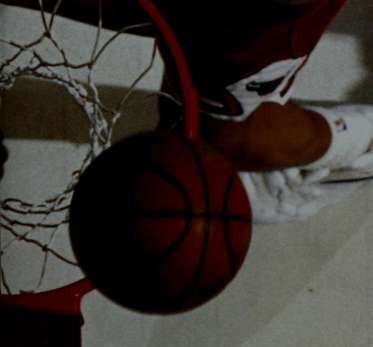
^^d's vi) someoni swean tie's going to play better the next night. But once the game starts that playe i misses his first shot. At that moment you can detect the slightest hesitation, the first hint ol Fear Instead of looking at the situation and saying, "OK, I have a good feel for the game now. I'll make the next one. one negative starts building upon another. It's like they start building this wall, one negative piled upon another, until tin y have no chance of finding a way to ock it down. If I missed a shot, so I had the freedom to accept the ice. I wasn't going to let a ot or a mistake affect the rest of I never allowed the negatives ver and pile up. In those relied upon past experience to games where I missed my first five shots and then made the next ten. I would try to bring that confidence into the moment. By staying in the moment I was never focused on what might happen two or three minutes later, which meant 1 wasn't thinking about the negative possibility of missing another shot. Why would I worry about a shot I hadn't even taken yet?That kind of think-ingjimits everyone, not just athletes. TheyTkren't comfortable with their skills
nm't have a good connection oner being. I tried to improve ery day. I needed to be able to look back to yesterday and feel like I'm belter today. During the game it was a matter keep^^^^^^^^^^^^^J how to settle your nerves the moment. I would look for opportunities to set the tone, to settle my mind, so I could let the game come to me instead of chasing it all night. That's one of the differences between a good player and a great one

t o

nncn i tyro « niu i ninnio liialu iu unwo ui un jununu. SISTERS WANTEO TO WEAR JEANS. BUT I WORE A COAT ANO TIE. FROM MY PERSPECTIVE, I VIEWED WEARING A COAT AND TIE AS BEING DRESSED UP.
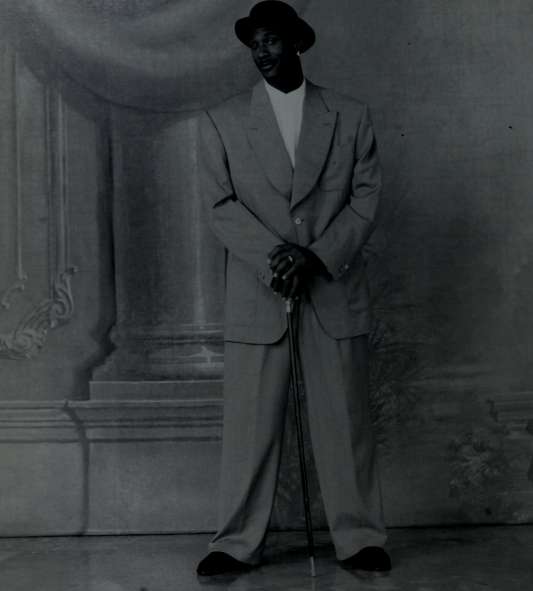
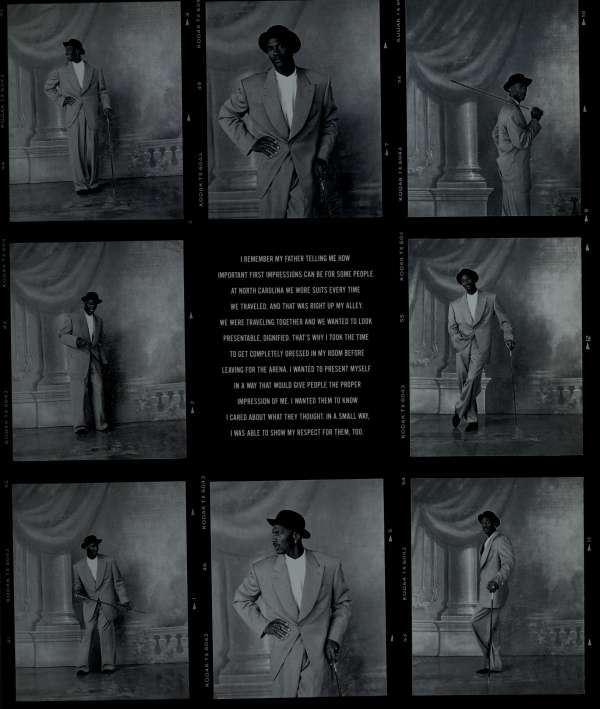
TEU YOUNGER PLAYERS IS TO ENIOY THE MOMENT AND BE CAREFUL NOT TO PUT THEMSELVES INTO A BOX & itED FOR THEM. SUCCESS WILL BREED HIGHER EXPECTATIONS. BUT THAT'S JUST A NATURAL EVOLUTION IN OUR ,1 ^
' SOCIETY 1 . YOU HAVE TO KNOW WHO YOU ARE BEFORE YOU CAN GROW AS A PERSON AND A PLAYER. f
LOOK AT KOBE BRYANT. HE DOESN'T EVEN KNOW WHAT KOBE BRYANT'S GAME IS YET. /
HOW COULD HE?
HE WENT FROM HIGH SCHOOL TO AN ENVIRONMENT IN WHICH HE HAS TO SINK OR SWIM. HE'S BEEN ABLE TO GET BY ON RAW PHYSICAL ABILITY. BUT HE NEEDS TO DEVELOP HIS OWN FOUNDATION BEFORE HE CAN BECOME A GREAT PLAYER. HE CAN GET BY BORROWING FROM OTHER PLAYERS IN THE SHORT TERM. BUT SOONER OR LATER HE WILL HAVE TO FIND HIS OWN GAME. THAT'S WHY COLLEGE IS SO IMPORTANT. IF I HAD COME RIGHT OUT OF HIGH SCHOOL INTO THE NBA I DON'T THINK I WOULD HAVE BECOME THE SAME PLAYER. I WOULDN'T HAVE HAD THAT FOUNDATION THAT NORTH CAROLINA PROVIDED. AT THE PROFESSIONAL LEVEL YOU HAVE TO PRODUCE. I WOULD HAVE FOUND WAYS TO COMPETE NIGHT AFTER NIGHT INSTEAD OF DEVELOPING A LONG-TERM PLAN.
CAN KOBE BRYANT BECOME
SURE. BUT IT'S GOING TAKE A LOT MORE EFFORT TO REFINE HIS SKILLS AT THE SAME TIME HE'S TRYING TO SURVIVE.
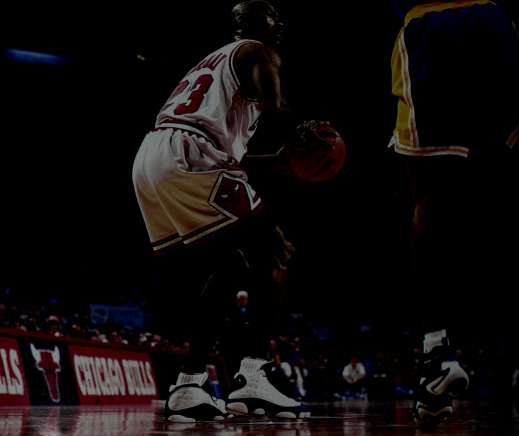
Y^oung players also need to know what makes them happy off the floor. What brightens your day? I don't think a lot of players ever gain that knowledge about themselves. They think they know. They think watching videos, going out to clubs, or hanging out with a different woman every night is the answer. If that's what you think makes you truly happy, then you're going to get burned, because it's fleeting. What are you left with when that's been your focus night after night? Those are the kinds of things I try to tell young players. Those are the kinds of conversations I have with Tiger Woods, too. Slow down. Enjoy life. Take it easy. Don't make it difficult. I think with all that was thrown at Tiger so quickly, he felt, quite naturally, that he had to live up to the hype. No one can live up
to that kind of hype. I learned that a long time ago. It's something Tiger will have to learn if he wants to perform at a high level and maintain that level for a long time. When I was 21 I was still eating McDonald's food every day. I wasn't trying to search for the perfect meal, for the perfect attitude, or the perfect technique. It just happened. That was the beauty of it all. These guys need to learn to live for the moment. Let it flow and see what happens. There is only so much you can control anyway. If you don't enjoy the process of becoming successful, then there is no beauty in the achievement. Enjoy the day. There will be another one tomorrow. Enjoy life for the sake of life.
IF I KNEW THEN WHAT I KNOW NOW
about what I would have to go through in Game 5 of the 1997 Finals at Utah,
I DON'T KNOW IF I WOULD PLAY.
If the outcome was guaranteed to be the same, then I'd probably go through it again. But if the outcome wasn't assured, there's no way I would do it again.
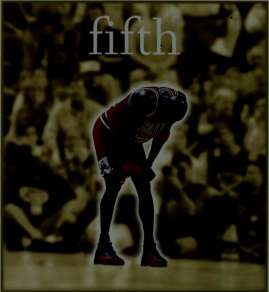
I COULD HAVE DIED FOR A BASKETBALL GAME.
I PLAYED THAT GAME ON HEART AND DETERMINATION AND NOTHING ELSE.
I didn't have any food, any energy, any sleep, or anything else. I don't even remember a lot about that game.
I have never felt as awful physically as I did in that game.
woke up at three in the morning with what seemed like stomach flu. I couldn't keep anything down and I couldn't sleep. I took something that I
thought would make me drowsy, but the symptoms were so severe I never got back to sleep. By the time I got to the arena I was fighting to stay awake.
I just sat back in the locker room drinking coffee, trying to wake up enough to play the game. I didn't have anything in my stomach and the coffee
really didn't do anything to wake me up. By halftime I was getting dehydrated, so I started drinking what I thought was Gatorade. But someone had
mistakenly handed me a bottle of GatorLode, which
have finished a difficult activity. By the time we
I felt bloated on top of being exhausted. I had con-
helped the dehydration come more quickly. There
that I felt like I was going to pass out. I remember "*
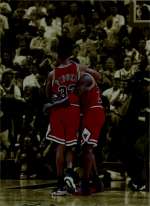
is what you are supposed to drink after you
went back out for the second half
tinued to drink coffee, which ultimately only
were times in the third and fourth quarters
thinking, "Get this game over so I can lie
down." In the fourth quarter, right before the three-pointer that won the game, I had become almost completely dehydrated. I was shivering, but I
continued to sweat. On that last shot, I didn't even know whether it went in or not. I could barely stand up. When I got back into the locker room the
doctors were really concerned because I didn't have anything left. I was cold, yet I was sweating and dehydrated. They wanted to give me intravenous
fluids, but I made it over to a table, lay down, and started drinking Gatorade. That's all I did for about 45 minutes. All for a basketball game.
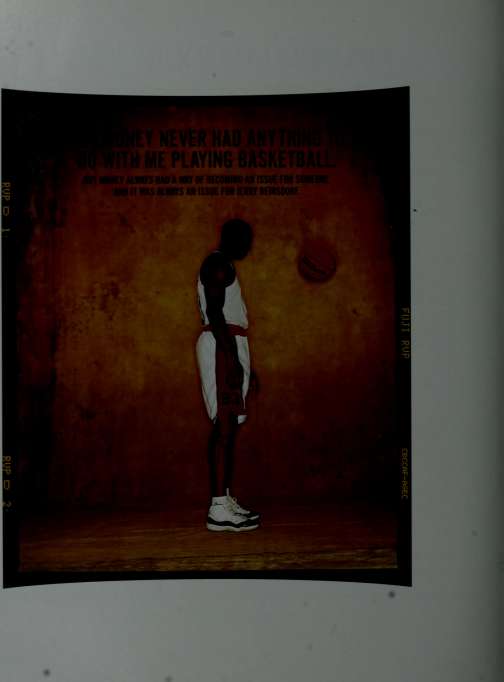
^^Ih- Bulls knew I wouldn't come back and play for anyone but Phil. my job and all I'm asking for is a raise.That could be a dollar or that could
After the 1997 championship, they knew they had to sign Phil before they be $6 million. I just want an acknowledgment from you that I did my
went after me. But they put a clause in Phil's contract that said if I didn't job." All I wanted was the team intact so we could defend our title. I
sign by a certain date Phil's deal was void. When we started negotiating figured both of us had saved face. I was able to have been rewarded for
my contract
for the 1997-98 season everyone knew what I had made the my performance and Jerry was able to say, "OK, we paid you a lot of
before. David Falk told the Bulls I deserved a 20 percent raise, the money, but we also have rewarded you with a number we feel comfort-
maximum allowed. His feeling was
that I had done everything I was
ud to do. We won another cham-
pionship, I won another scoring
title, I made the All-Defensive First
Team. Jerry 's opinion was that I
* able with." My first thought was,
Wis
2: TL ^
"Great. Now let's go out and do it
again." But I knew it never should
have come to that kind of discus-
sion. We should have been way
past that point, particularly after
had been paid a lot of money for that performance and I shouldn't get what happened the year before. Following the 1996 season I signed a one-
anything more.The discussion eventually went all the way back to my first year deal. Before I left the room, Jerry said something I'll never forget. It
two contracts and how I wasn't paid market value at the time, so these changed my opinion of Jerry Reinsdorf. We shook hands and he said, "At
kinds of numbers were in order to balance the sheets. Finally, I said, some point in time, I know I'm going to regret what we just did." After
"Look, Jerry. My agent is here. You are here. Why don't we split it down all these years, after all these championships, after all I had tried to do for
the middle, shake hands and get out of here. I'm not out here trying to the Bulls organization, after all those years of being underpaid and you
rob you. I want you to
know I lived up to my end of the bargain. I did regret paying me market value? It was like a punch in the heart.
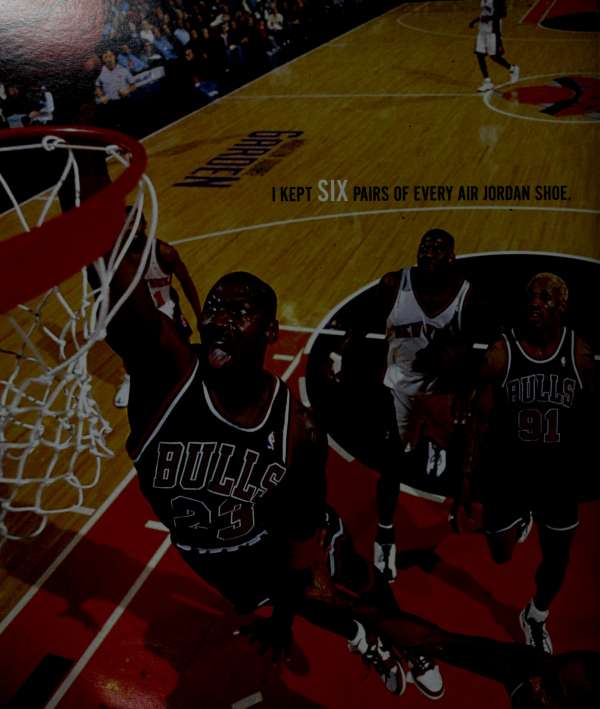
MADISON SQUARE GARDEN
FIRST GAME-November 8, 1984: Bulls Rl-Knicks 106
Chicago Bulls starting lineup: Steve Johnson(F), Orlando Woolridge(F), Caldwell Jones(C), Ennis Whatley(G).
THE NIGHT BEFORE WE WERE LEAVING TO PLAY OUR LAST GAME IN NEW YORK IN 1998, MY WIFE WAS DOING SOME SPRING CLEANING AND MOVED THE SHOES FROM ONE STORAGE CLOSET TO ANOTHER. I THOUGHT,
"THIS MIGHT BE MY LAST TIME IN NEW YORK.
LET'S GO BACK TO THE BEGINNING
AND WEAR THESE SHOES."
\J had worn them before in practice and I thought they were too tight. But it was New York—why not try something different? No one knew I had the shoes in my bag until I started lacing them up. I didn't know for sure I'd wear them in the game until after I tried them out in warm-ups. By then the shoes had caught people's attention, so why not go with it?That's how I approached the game. I wanted to go out there and have a good time. It was a heck of a statement about my feelings for New York. I appreciated playing in New York from the beginning to the end. Plus, we won the game. Their tribute to me was the standing ovation they gave me when I left the court.
It was like I was watching everything unfold in slow motion on television.
In Came 1 ol the 697 NBA Finals against Utah. I went left hit the game winning shot because Byron Russell
mil I' ould see every player and I remember exactly where they were as I came up the floor. Steve Kerr was in the corner. John Stockton taked at me and was going to come to me. I was up top Dennis was catling underneath the


led. causing him to be off balance In 1998
The one thing I
didn't want to do was cross over because that would put the ball back into play. All this I knew, but as the shot unfolded, I went
through those options instinctively.
unfolded slowly enough for : to evaluate every single tiling that was happening. I was able
capitalize what to do
i Jo1111 Stockton wasn't .mout to hen Steve hit Ike winning shot in n Stuck ton Liked Uiw.iiiI me and
I had no intention of passing the ball under
any circumstances. I figured I stole the ball and it was my oppor-
tunity to win or lose the game
have taken that shot with have problems ping to my tight cause I nave i tendency to come little. But on this shot I didn't snots had been shmt Think think about those issues pj^l^^Kened mil i came straight down
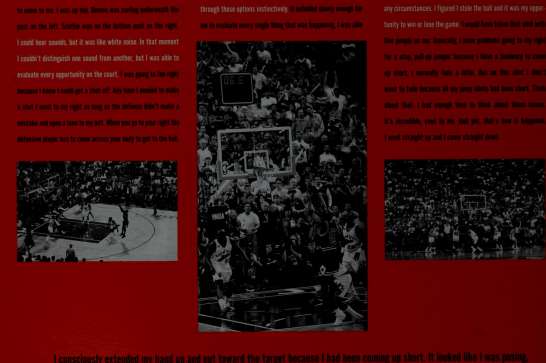

I consciously extended my hand up and out toward the target because I had been coming up short. It looked like but it was a fundamentally sound shot. It's truly amazing that I can break down a game into all those par
amount of time and then execute the play.
ALL THAT HAPPENED IN ABOUT 11 SECONDS.
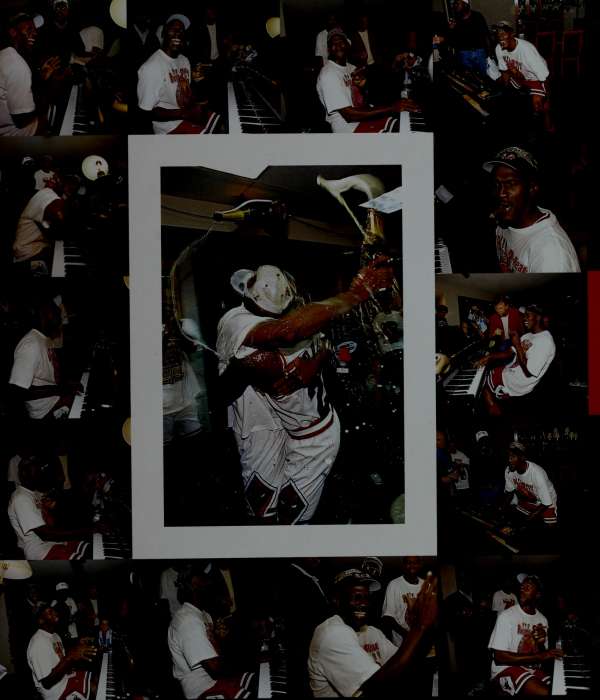
WHEN THE NEWS BROKE DURING THE SUMMER ABOUT THE BULLS HIRING TIM FLOYD I WAS DOING MY BASKETBALL CAMP AT ELMHURST COLLEGE OUTSIDE CHICAGO. WE WOULD HAVE A QUESTION-AND-ANSWER PERIOD WITH THE KIDS. USUALLY THEY WOULD ASK WHAT KIND OF GUM I CHEWED, STUFF LIKE THAT. ONE OF THEM ASKED ME WHY I DIDN'T WANT TO PLAY FOR A COACH OTHER THAN PHIL JACKSON. I SAID, "LET ME GIVE YOU A COMPARISON. IF YOU GREW UP YOUR ENTIRE LIFE WITH ONE SET OF PARENTS AND YOU GOT TO A CERTAIN AGE AND YOU WERE ASSIGNED NEW PARENTS, WHAT WOULD YOU WANT? WOULD YOU WANT TO STAY WITH YOUR ORIGINAL PARENTS OR WITH THE NEW PARENTS? THE OLD PARENTS WERE THE PEOPLE WHO TAUGHT YOU EVERYTHING, FED YOU, HELPED YOU THROUGH CERTAIN PERIODS OF YOUR LIFE. NOW THEY SAY YOU HAVE TO GO THROUGH THE SAME PROCESS WITH NEW PARENTS?" THAT'S HOW I FEEL ABOUT PLAYING FOR ANOTHER COACH.
ALTHOUGH IT WOULD HAVE BEEN HARD TO PLAY FOR ANOTHER COACH,
I ALWAYS WONDERED HOW IT WOULD HAVE BEEN TO PLAY FOR NEW YORK.
GIVEN THE FACTS OF PHIL'S DEPARTURE AND THE BULLS' DESIRE TO REBUILD. I WOULD HAVE SERIOUSLY CONSIDERED PLAYING FOR THE KNICKS DURING THE 1998-99 SEASON IF I WERE SINGLE
NEW YORK FANS APPRECIATE GOOD PLAYERS AND I ALWAYS ENJOYED PLAYING IN MADISON SQUARE GARDEN.
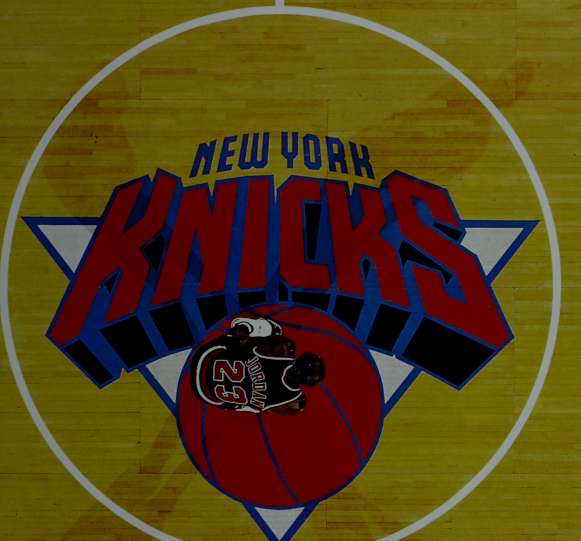


TOMORROW I DON'T KNOW WHAT I'M GOING TO DO.
I THINK ABOUT TODAY.
PEOPLE DON'T BELIEVE I DON'T KNOW WHAT'S GOING TO HAPPEN NEXT WEEK, NEXT MONTH, OR NEXT YEAR.
fin

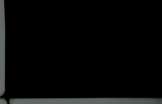


BUT I TRULY LIVE IN THE MOMENT.
That's what retirement means. You can design and choose your moment. I can design shoes one day and ski the next. I have created the opportunity to have a choice.That is how I am going to live. I am not going to determine what the moment is going to be a week from now. I've never done that and I don't like living that way. I would feel too confined. To me, retirement is having no restraints. I won't be retired fully until I don't have to do anything. One day I won t have to do commercials, or talk to a board, or help in the design of shoes. I will be able to wake up when I wake up. As long as I live in the moment I don't believe I will ever get bored. I am not going to mmd being out of the spotlight.





MY PROBLEM IS THAT EVERYONE EXPECTS ME TO LIVE IN THE FUTURE.



Where did it come from? I don't know. That's like asking an artist where his inspiration comes from. Phil Jackson told us many times to deal with what's happening right now. It's an idea that always has been with me. My heart and my soul are in the moment. The best thing about living that way is that you don't know what the next moment is going to bring. And that was the best thing about the way I played the game. No one, not even me, knew what I was going to do next. If I had to pick one characteristic about my game that would be it. I always thought I performed my best when I didn't know what was coming. I didn't know I was going to go out there and score 63 points against the Boston Celtics in my second season.They didn't either and that's why it was a beautiful experience. No one could have expected that to happen. They were stunned, just like I was. What's more beautiful than that 7

■l


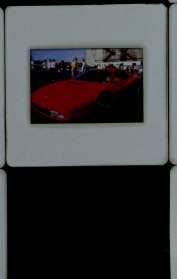

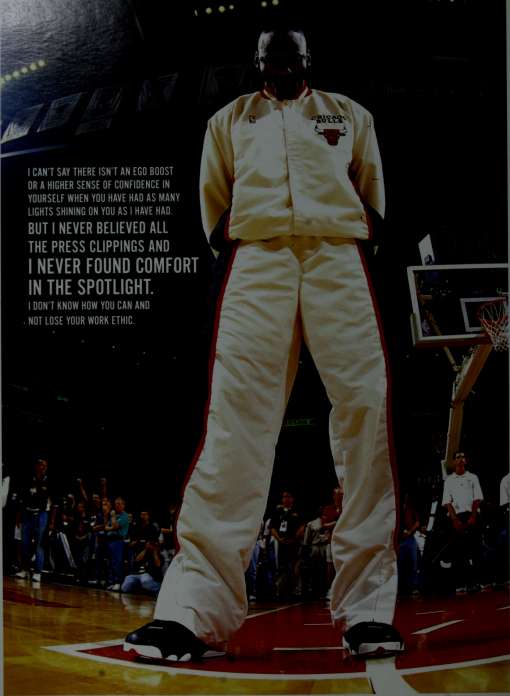
©here is no such thing as a perfect basketball player, and 1 don't believe there is only one greatest player either. Ever) one plays in different eras. I built my talents on the shoulders of someone else's talent. I believe greatness is an evolutionary process that changes and evolves era to era. Without Julius Erving, David Thompson, Walter Davis, and Elgin Baylor there never would have been a Michael Jordan. I evolved from them. They presented a challenge, the example I could improve upon. I had the idea that "I have to be better than David Thompson. I have to be better than Julius Erving. I have to be better than Magic Johnson." Those were guiding forces in my development and I used them as motivation.
If I had been born on an island, learned the game all by myself, and developed into the player I became without ever seeing another example, then yes, maybe I would accept being called the greatest. But I have used all the great players who came before me to improve my skills. So 1 can't be the greatest. It's not fair to diminish them that way. The evolutionary process never ends. Somebody is going to improve upon my game. I don't think I will live to see somebody score 100 points in a game again, but there will be players who evolve and move the game ahead. What could a player do to improve upon my example? The> asked the same thing about Elgin Baylor and Dr. J. And that's the beaut) of it all. No one knows.
We have seen different aspects of greatness in different bodies. Now we have seen many of those same aspects in one body. I'm certain down the road even more greatness will be seen in a single player. It used to be that great offensive players never played great defense. There was a driving force in me to prove that notion wrong. I proved a great offensive player can play great defense. But somebody will come along who plays even better offense and defense than me. The evolution of greatness doesn't stop with me just as it didn't stop with Baylor, Dr. J, Larry Bird, or Magic. The nature of evolution is to continue. We have all passed something along through our performance and all that has been written.
Somewhere there is a little kid working to enhance what we've done. It may take awhile, but someone will come along who approaches the game the way I did. He won't skip steps. He won't be afraid. He will learn from my example, just as I learned from others. He will master the fundamentals. Maybe he will take off from the free-throw line and do a 360 in midair. Why not? No one thought they would see a 6-foot-9 point guard or a 7-foot-7 center. But here we are. There are now more 6-foot-10 perimeter players than at an) time in history. Magic-would have been a center 30 years ago. Evolution knows no bounds. Unless they change the height of the basket or otherwise alter the dimensions of the game, there will be a player much greater than me.
I LISTENED,
I WAS AWARE OF MY SUCCESS,
BUT I NEVER STOPPED
TRYING TO GET BETTER.
ghis mid early mornings, and Jordan speni countless hours for (his book, Bill Huclsler idsters vision for (his project fiiUwidtJ with Run Air's desire In redeline ihe stun dard lor \isual uuiohioijruphitul hooks. Thanks (o Mr. Huelster and dozens of others, during the past 12 months opportunity became reality.
From our production partners, all of whom went beyond any reasonable expectation, to Steve Ross and the class act that is Crown Publishers, to our families and friends, the net worth of their contributions is self-evident.
Randy Ginsbergs passion and vision continue to define George Rice & Sons in the print industry. .4t Potlatch Corporation, Molly Foshay led us through the process of creating a custom proprietary sheet ol paper designed to meet our unique print production demands. Like Mr. Ginsberg, Molly's hard work and friendship are forever appreciated.
At BindTcch, Dale Nichols showed the power of the entrepreneurial spirit by retooling an entire company to accommodate this project.
Al Rare Ah, the focus and depth of commitment from Jim Forni and John Vieceli defy expectation. As 100-hour weeks turned into months, the effort, physically and mentally, never dulled. Indeed, they did the work of 10 and no one ever missed the other eight. Their passion is a gift to all those who come in contact with them.
The friendship, support, and love of my wife, Laura, and the blessing that is our daughter,Alexandra, brightened the darkest days and brought comfort to the longest nights.They are my life.
Our collective blessing remains the wonder that is Michael Jordan. Work sessions ran over, photo shoots took much longer than expected, and our demands inevitably extended beyond the parameters of our business model. But the spirit that flows through the corners of Michael's personal life is the same one that defined his professional career. He worked the long hours necessary to bring this project to life despite day-to-day expectations that would have folded a lesser man. Even during the NBA Finals, a time when most would have been consumed by the moment, Michael found peace amid the storm. He opened his house, his life, and his family to all ol us despite the blinding glare of celebrity and a late-20lh-century culture defined by its desire to deconstruct. Through it all, Michael Jordan showed the world that greatness, true greatness, comes from the inside out. In the end, (hat's why there will never be another one like him.
Mark Vane il October, 1998
SPECIAL THANKS
Al Rate An
Paul Sheridan. Fs<|., Christy Fgan, Mclhula Pry, Seth Guge, GinaVieceli, Pel /epernkk, Ruk Dresses. John 1 lenncssey, and corporate physician, Dr.Tcrr> Sullivan
At FAME
David Palk, David Bauman, Mar)' Ellen Nunes, and Estee Portnoy.
At JUMP, rnc.
Jackie Banks, (Jus Lett, Clarence Travis, Calx in Holliday, Joe Rokas.Tom West and John Wo/niak.
Al Crown Publishers
Chip Gibson, Steve Ross, Joan DeMay o, Andy Martin, John Groton,Teresa Nicholas. Hilary Bass, Bruce Harris, Laurie Stark, Debbie Koenig, Jo Pagan, Rebecca Strong, Christian Red, Rich Romano, Amy Boorstein, Florence Porrino, and Mark McCauslin.
At The National Basketball Association Charlie Rosenzweig, Jan Hubbard, Carmen Romanelli, Nat Butler, Andew Bernstein, JoeAmati, Pric Weinstein, Chris Pkstrand. Mark Broussard, Mark Hale, John Hareas, and Jeanne Tang.
Al Brand Jordan/Nike
Howard White, Erin Patton, and Nick Choy. Others
George Koehlcr, Liz Silverman, Sharon Powell, and Elias Sports Bureau, Inc.
Compilation Copy right © 1998 by Rare Air, Ltd. Text Copyright © 1998 by Michael Jordan
All rights reserved. No part of this book may be reproduced or transmitted in any form or by any means, electronic or mechanical, including photocopying, recording, or by any information storage and retrieval system, without permission in writing from the publisher.
Published by Crown Publishers, Inc.,
201 East 50th Street, New York, New York 10022.
Member of the Crown Publishing Group.
Random House, Inc. New York, Toronto, London,
Sydney, Auckland
www.randomhouse.com
CROWN and colophon are trademarks of
Crown Publishers, Inc.
Printed in the United States of America
Design by Rare Air, Ltd. ,
Library of Congress Cataloging-in-Publication Data Jordan. Michael, 196 3—
For the love of the game : my story / Michael Jordan. — 1st ed. p. cm.
I. Jordan, Michael, I 963- . 2. Basketball players — United States — Biography. 3. Chicago Bulls (Basketball team) I.Title. GV884.J67A28 1998 796.323 '092 |B]—DC2I
98-8172 CIP
ISBN 0-609-60206-3 10 9 8 7 6 5 4 3 2 I First Edition
Prepress: Plate ready film and scanning lor text prepared by Professional Graphics, Rotkford, II Special thanks to Pat Goley, Steve Goley, Pete Knipschield, and Curt Ennenga. Plate-ready films and st aiming for dust ]acket and e ndpapers prepared by George Rice & Sons, division ol World Color, Los Angeles. CA.
Paper: I00# Rare Air Gloss Text.
Dust |a<.ket and text stock custom manufactured for maximum retained ink gloss, brightness, and bulk by Potlatch, Cloquet, MN. Special thanks to Molly Foshay and the Potlatch Manufacturing Department.
Lithography: Dust jacket prints 4-color process plus PMS 8641 gold; touch plates in PMS 18S red, PMS 3SS green, PMS 873 gold; plus gloss UV coating on an 8 color Komori Cold UV 28 X 40 press.
Endpaper prints two blacks + PMS 8S80+vamish.
Text: 4-color process plus: form 1 PMS 021; form 2 PMS 199; form 3 PMS 1215; form 4 PMS 877; form S PMS 199; form 6 PMS 810; form 7 PMS 199; form 8 PMS 2nd black #6; form 9 PMS 199; form 10 PMS 199; form II PMS 137; form 12 PMS 9 160; form 13 PMS 021 on a Heidelberg Harris M600. Special thanks to Randy Ginsberg, Steve Solomon, and George Mathews at George Rice & Sons.
Binding: Black Kingston cloth vv rapped around 110 pt. board. Gold foil stamping. Smy th sewn on an Astor sewer and cased in on a Kolhtis Compact. BindTech Inc., Nashville.TN. Special thanks to Dale Nichols, Hunt Nichols, Dennis DeHainut.
PHOTO CREDITS
ANDREW 0. BERNSTEIN/NBA PHOTOS 25, 38,40,46-47,50,74-75,76,
88,89,99,129,136-137,150,153,154
RICH CLARKSON/SPORTS ILLUSTRATED 43
SCOTT CUNNINGHAM/NBA PHOTOS 20,31,148
CORBIS 6-7,30
STEVE BONINI 37
NATHANIEL S. BUTLER/NBA PHOTOS 39,40,42,44,45,46,47,48.49, 50,59,60,63,82,84,88,104-105,120,126,127,129,130,132-133.
142,143,151,153
TONY PI ZINNO 4-5
SAM FORENCICH/NBA PHOTOS 129,140-141
CHRIS HAMILTON/SPORTS ILLUSTRATED 64-65
MARK HAUSER 55 [photo courtesy of BigsOy h Krutners)
LOREN HAYNES 107
ANDY HAYT/NBA PHOTOS 121
WALTER I00SS. IR. 1,10,11,26,27,35,36,52-53,61,65,66-67,68,69,
71,77,78-79,80-81,84,85,87,88,89,94,95,96,98,100,101,112,
113,114,115,116-117,119,134,144,145,146,117,119,136,146,147,152
FROM THE LENS OF GEORGE KALINSKY. MAIOR LEAGUE. INC. 86
STEVE LIPOFSKY/SPORTS ILLUSTRATED 34
JOHN MCDONOUGH/SPORTS ILLUSTRATED 29,152-153
FERNANDO MEDINA/NBA PHOTOS 58,148
MANNY MILLAN/SPORTS ILLUSTRATED 20,50,146-147,152-153
BUCK MILLER/SPORTS ILLUSTRATED 13
COURTESY OF NIKE. INC. 16,17,18,37,122,123
SANDRO 9,111,134
BILL SMITH 12,13,14,15,20, 21,22-23,24,28,46,50,51,56-57,62, 72-73,83,88,89,90.91,92,93,97,101,102-103,104,106,109,128,
129,130-131,149, 152-153
PETE STONE 108
BILL SUMNER 2-3
CATHRINE WESSEL 138,139
STEPHEN WILKES 32-33
SCOTT WINTERON NBA PHOTOS 148
810 632
655 .682
600 .552
.909
.929 667
.818
.833
.740
.455
682
ARCO Arena
Alamodome
America West Arena
Arizona Veterans Arrowhead Pond Memorial Coliseum of Anaheim
3 103 34.3 38 3 103 34.3 38 4 135 33.8 40 6 202 33.7 43 1 37 37.0 37
CoreStates Center
Delta Center
Fleet Center
General Motors Place
Georgia Dome
4 98 24.5 31 4 155 38.8 44 5 158 31.6 37 3 77 25.7 29 2 61 30.5 34
Kemper Arena
Key Arena
Lakefront Arena
(New Orleans, LA)
Los Angeles Memorial Sports Arena
MCI Center
1 25 25.0 25 3 93 31.0 45 1 34 34.0 34 10 307 30.7 49 1 19 19.0 19
Oakland Arena
Orlando Arena
Pontiac Silverdome
Portland Memorial Coliseum
Reunion Arena
11 288 26.2 49 12 371 30.9 52 9 326 36.2 61 8 266 33.3 46 11 317 28.8 43
Spectrum
Target Center
The Coliseum
The Kingdome
The Omni
21 753 35.9 52 6 175 29.2 35 23 736 32.0 69 3 89 29.7 35 27 830 30.7 48
MINUTES FGM FGA FU% jruM ji-um jiu™
675 209 411 .509 27 62 .435